I don't know what was worse when I woke up, the headache or the smell. I was sprawled on one of the beds in the salubrious Safwan Hotel. I had a vague memory of getting back to the hotel. Then I realised that Sami had arranged to take us to his farm today for an all-day picnic. Sami is a warm, hospitable guy, but he doesn't half turn the screws when he wants company.
Staggering down to the reception, I bumped into Grace. Sam was still in bed, moaning off the scotch little by little. They were not going to Sami's farm. I also had an excuse - today was the day I was going to Damascus, the jewel in the crown of my trip. I had to get there and unless Sami could get me back to the hotel or bus station by 17:00, no sale.
13:00 rolls around and as arranged, Sami pulls up, honks, gets out, comes in and sits down.
"Let's go," he said.
"Yeah," I replied. "About that..."
Grace begged off because Sam was still in bed, performing a full Camille. I explained that unless he promised to have me back by 17:00, I'd turn into a pumpkin. Sami cajoled, requested, demanded, insisted, suggested and generally pulled as many strings as he could but in the end he told me that if we went to his farm I wouldn't be back until at least 22:00. Ergo, no farm for me. Sami and I exchanged numbers and he fish-eyed me and Grace closely before leaving without us. I got the impression that he was disappointed.
Grace and I went to arouse Sam from his stupour only to find him in fine fettle, ready to take on the world as long as the world did not include Sami's farm. The three of us slunk into the centre of Lattakia, studiously avoiding Sami's haunts, and surreptitiously enjoyed a wholesome Syrian breakfast of shwarma and garlic sauce. As we ate, who should arrive out of nowhere but Captain Libya, fresh off the bus from Lebanon! He and his new companion, a Syrian student named Lauron, ate and then we all repaired to a Corniche tea house to play some crackgammon and drink chai khameer, the same as normal tea but served with way more sugar and without the tea bag.
I again lost track of time while playing and realised that I would be hard pressed to catch the 17:00 bus to Damascus, which takes four hours. I hurried back to the Safwan, paid Mohammed, said goodbye to the crazy uncle and the degenerate dwarf pervert and was kindly escorted by CL and Lauron to the bus station, where I got my ticket and was firmly ensconced on the 18:00 bus. CL assured me that when I got to Damascus, all I had to do was go to the Methat Pasha main drag and stumble into one of the numerous budget hotels he said awaited me there.
The bus ride to Damascus passed without incident, apart from the presence of the first and only Arab body-builders I have ever seen, two of them, necks like engine blocks, wider than their seats, smoking cigarettes that looked like matchsticks in their sausage-fingered hands. Ridiculous.
I arrived at the Damascus bus station and, luckily forewarned by my trusty Lonely Planet, managed to get a taxi to the Old City for the correct price (50-ish Syrian) as opposed to the taxi scumbag price (200 Syrian). All it took was one honest cabbie who happily put on the meter without me having to ask and even insisted that I drink his cup of tea that jiggled tantalisingly in the cup holder. As we approached the Old City, the streets became more and more narrow, the buildings more and more decrepit, until eventually we were stuck in a traffic jam caused by a road built for horses that had been double- and triple-parked upon until only single file traffic was possible and even then exceedingly difficult. I paid my cabbie, strapped on my gear and headed for Methat Pasha, the main street of the Old City, by day crowded with hawkers and shopkeepers, by night deserted and unlit, eerie in the absence of all noise. I asked a guy wearing a death's head t-shirt for directions. He walked me there. After a few paces, I noticed that he was staring at my hair and beard. He caught my eye.
"Metal?" he asked.
I was momentarily baffled. By way of explanation, he threw up the horns. Awesome. He told me there was metal to be found in Damascus. I looked but never found. His name was, of course, Mohammed. He gave me his number and left me at the start of Pasha street. It was enormous, a huge vaulted ceiling covering what by day is one of the oldest and busiest bazaars in the world. I walked along, seeing no lights and, more importantly, no budget hotels. I came to the end of the street, which degenerated from stately shops and covered roof to piles of rubble in the middle of the road and old houses leaning against each other and groaning like drunks. I asked a group of three guys if they knew where I could find a cheap hotel. In true Syrian style, they insisted on accompanying me for the next forty minutes, tramping around the Old City, looking for a place to stay. One of them was tall, thin and quiet. The talkative one was a sound recordist for Syrian television. The third was dressed all in denim with a centre parting to his hair and a dangerously rakish moustache. He looked like an Arabic Douglas Fairbanks.
They walked with me for ages until we found the ominously named Shahbandar Palace Hotel. I seriously doubted if a hotel with the word "palace" in the name would be in my price range. We rang the buzzer. A slim, nattily dressed guy of about my age answered the door. He spoke excellent English. This place was going to be expensive. I asked how much for the cheapest room.
"120 dollars," he answered.
Shit.
"Is there anywhere cheaper?"
He held up a finger, took out his mobile, made a call, chatted in Arabic for a few moments and then hung up.
"Is 30 dollars alright?"
"That's still way too much," I said apologetically, feeling like an abject hobo surrounded by all these helpful guys.
The guy, whose name was Ammar (his nickname was Mac), made another phone call. He talked, listened, talked again and hung up.
"Okay," he said. "You can stay with me."
"What?"
He spoke to the three guys accompanying me in Arabic. Then he turned back to me.
"They will take you to the internet cafe where my roommate is. He will let you in. I'm sorry but he doesn't speak English. Is that okay?"
I was dumbfounded. I knew the Syrians were nice but this was the absolute limit.
"Are you sure?" I asked, still expecting some sort of joke.
"I'll see you at midnight," Ammar said. "Now go take a shower and relax."
The three guys walked me to the internet cafe to meet Syaman, Ammar's roommate, a Syrian Kurd. As they walked, the Arabic Douglas Fairbanks turned to me and said something that, in the moody lighting from the sparse streetlamps, with the sounds of the Old City murmuring around us, the smells of the warm, humid Middle Eastern night, really caught me off guard and seemed to be more meaningful than I'm sure it was intended to be. He looked me square in the eyes.
"Your mother really loves you," he said.
I froze for a moment and then kept moving. I'm sure it's just a phrase he translated in his head from the Arabic, something they say whenever someone has a stroke of luck, but in context it felt like much more than that. I smiled at him and nodded.
"I'm sure she does," I answered.
We met Syaman at the internet cafe, my three friends said goodbye and Syaman and I walked the five minutes or so to their apartment. Ammar's apartment was one room rented in a shared house. The family that owns the house lives on the ground floor. On the second floor are four bedrooms all rented to expatriates, apart from Ammar. Ammar's room was about eight feet by twelve feet and in it were two single beds. His regular flatmate, a German archaeologist, was away on a dig. Syaman was crashing there for the fifteen or so weeks that the German was away. Syaman was a dark, broad guy with a ready, easy smile and the snazzy dress sense I had come to expect from the Syrians. They are a people that are always dressed formally. Even if they live in a dirt-floored shack, they have at least two sets of formal clothes that they wear out of doors. Syaman taught me to count from 1 to 6 in Kurdish and also taught me the word for "good", which is bash. Zar bash means very good. We communicated in a haphazard manner for about half an hour and then I took a shower. The facilities are shared between the rooms - a common kitchen and a shower room with a Western toilet. The roof of the house is an open terrace with the rooms built in a bungalow style around the square rooftop.
After my shower, I returned to the room to find Ammar back from work. He asked how I was settling in. I thanked him profusely and he interrupted me.
"It makes me angry when you say thank you," he said. "Stop it."
I told him I just didn't know how else to express gratitude. Ammar shrugged.
"This is how we do things here. Maybe one day if I am in London I can stay with you in your home."
I told him it would be my pleasure. He grinned and asked if I was hungry. Before I could protest, Syaman ran off and returned ten minutes later with a pizza, three shwarmas and a bag of soft drinks. They asked if I wanted a beer. I declined. We ate our shwarma and shared the pizza. Ammar asked me about London and what I thought about Syria. He told me about his job and his life. He was from Qamishli, the border town with Turkey. He worked as the night receptionist at the Shahbandar and he had just earlier that day secured himself a two year contract in Dubai at the Palms resort as the reservations manager. At the Shahbandar, a hotel that charges $120 a night for a single room, Ammar made $400 a month. This was very good for Syria, he told me. At the Palms, he would make $1500 a month with accommodation included as a perk of the job. He was very excited about the trip. With his half of the rent being $100 a month, he was currently living on $300 a month, a princely sum for the average Syrian. While I stayed with him, he refused to allow me to pay for anything, even if I tried to sneak. When we went to the internet cafe, he paid. Both Syaman and Ammar, like all Syrians, were smokers, but when they found out I didn't smoke they both smoked outside without a word. I told Ammar that he could smoke inside - after all, it was his place. He told me that if I didn't smoke it would be rude to smoke around me indoors. Syaman agreed and they both took turns smoking on the terrace for the whole time I stayed there. They didn't even smoke in the room when I was out, just so that the room wouldn't smell. When I told Ammar that I have very good friends in London who smoke around me even though they know that I don't and that it aggravates my asthma, he was shocked.
"Why would they do that?" he asked, seriously at a loss. "That's a horrible thing to do to a friend!"
The level of hospitality I enjoyed with Ammar and Syaman was overwhelming.
I got a text from CL asking me where I was staying so he could meet me there the next day. Ammar asked about the text, I explained and Ammar insisted that CL come stay with us at his place. I started setting up my sleeping bag and he asked me what I was doing. I told him I had an air mattress and would be fine on the floor. He asked why I wanted to sleep on the floor. I pointed out that there were two beds and three of us. He told me he and Syaman would share one bed and I would have the other one. I said that that was ridiculous - I couldn't take a bed to myself if my hosts were sharing. He told me that I could sleep on the floor if I wanted but the bed would remain empty on principle even if I didn't take it.
We chatted about life and travel for another hour or so and then I started to doze off. I apologised but Ammar told me to go to sleep and he and Syaman would go to the internet cafe so as not to keep me awake with their talking. My protests were weakened by the fact that I was already basically asleep. After much moral debate, I slept in the bed. And I slept very well.
Wednesday 28 May 2008
Sunday 25 May 2008
Day 19: Lattakia - Be our guest, be our guest
So I didn't go to Damascus today as I planned. Instead I ended up teaching Sam and Grace, two young travellers from Britain via the Netherlands, how to play crackgammon. Then the monkey was on my back and we sat in the local tea house playing all afternoon.
In the morning, before heading out, Mohammed's crazy uncle had a visit from his dentist. Not just any dentist. This guy was a gypsy dentist who carried his surgery gear around in a black leather satchel. He was re-cementing Mohammed's uncle's front teeth, which are fakes. This is what a Syrian gypsy dentist and his patient look like, by the way.
Lattakia worked its magic on me slowly. The sea air, the laidback atmosphere, the cheerful people, all of these things worm their way into one's affections until plans for onward travel take on a distasteful, unpleasant quality. Why would I want to sit on a bus for hours and then fight through the streets of Damascus looking for a place to sleep? I'm sitting in the sun, the sea breeze is cooling my heels and I have unlimited games of crackgammon stretching ahead of me like the soothing dunes of the Sahara. I had been sucked into the Black Hole of Lattakia and I was Ernest Borgnine.
As we sat at the cafe, playing away, a man wearing glasses and sporting quite pronounced but not altogether unpleasant teeth strode purposefully up to the table, looked us over cursorily and announced "My name is Sami. You will all be my guests for dinner tonight." That was how he introduced himself. Sami went on to explain that he was a local farmer and would be honoured if we would join him, his wife and his wife's mother for an evening of traditional Syrian food and music at the local swanky hotel, Al-Cazino. Of course we accepted. Over the course of the evening, however, it became increasingly clear to me that if Sami was a farmer, I was Jesus.
Sam and Grace moved to another table to play each other and Sami joined me at the board. He ordered tea for us both and then proceeded to hand me my ass in a merciless fashion. I learned a great deal from playing him. He called his wife several times and eventually she arrived, driving his car. She was wearing make-up, tight jeans and a leopard print top. Their Filipino maid was sitting in the front with them. Sam, Grace and I piled into the back.
At their apartment, Sam, Grace and I were offered fruit, candy and nuts while Sami and his wife bustled about getting ready. Their Filipino maid fetched drinks and, when Sami and his wife were not in the room, happily answered questions about how she ended up in Syria. She told us that lots of Filipinos work in the Arab world as domestics. Her agency in the Phillippines sent her to Lebanon, which she hated, and then offered her the choice of going back to Lebanon or to Syria. She chose Syria. I asked her if she liked it. She waited pointedly until Sami's wife left the room and then said that it was better than Lebanon, but with a look on her face that said she would much rather be somewhere else entirely.
Sami and his wife were a very progressive couple. They eschewed traditional dress and formality in favour of very Western habits. 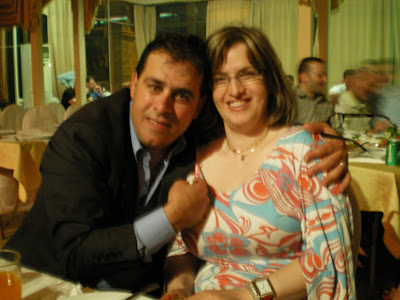 Sami happily talked to us while wearing his towel straight out of the shower. He and his wife had a playfulness that I had never seen in an Arab country before. His wife showed us stacks of photo albums, including their wedding pictures, in which she is sporting quite the quiff and wearing what would be classed as a racy number even by Western standards.
Sami happily talked to us while wearing his towel straight out of the shower. He and his wife had a playfulness that I had never seen in an Arab country before. His wife showed us stacks of photo albums, including their wedding pictures, in which she is sporting quite the quiff and wearing what would be classed as a racy number even by Western standards.
Sami's mother-in-law arrived with her Filipino maid. Apparently they are all the rage in Lattaki right now. Mother-in-law was a really tough audience. She spoke no English and glared at me in that tight-lipped manner that older women have that gives you the impression that they've seen through you in some way even if they haven't. For a while I was sure she had smelled Jew on me, but I was thrown a lifeline that I pounced on to great effect.  Sami was watching the news and the Future party was mentioned. I asked him who he supported in Lebanon. He said that he was for Hezbollah, 100%. He also said that I would be hard pressed to find anyone in Syria who didn't take Hezbollah's side. He said that many, including himself, had written Hariri off as a Western puppet. I immediately whipped out my camera and showed him the pictures of me in Baalbek, at the gift shop, in the mosque. I told him about my meeting with Abou Yasser and Fatah al-Intifada. He translated for his mother-in-law. She broke into a veritable sunstorm of smiles. Problem solved. I was in. I was one of the family.
Sami was watching the news and the Future party was mentioned. I asked him who he supported in Lebanon. He said that he was for Hezbollah, 100%. He also said that I would be hard pressed to find anyone in Syria who didn't take Hezbollah's side. He said that many, including himself, had written Hariri off as a Western puppet. I immediately whipped out my camera and showed him the pictures of me in Baalbek, at the gift shop, in the mosque. I told him about my meeting with Abou Yasser and Fatah al-Intifada. He translated for his mother-in-law. She broke into a veritable sunstorm of smiles. Problem solved. I was in. I was one of the family.
We headed for the restaurant, which was situated in the lobby of the Al-Cazino hotel. When we arrived, the room was empty. It was Thursday night, which is Friday night in the Muslim World. We were brought hummus, baba ganoush and salads which were excellent. The meal progressed at a very lackadaisical pace. Sami had insisted that we would drink with him, so while he put away glass after glass of arak, Sam and I had been given a litre of Grant's scotch to deal with.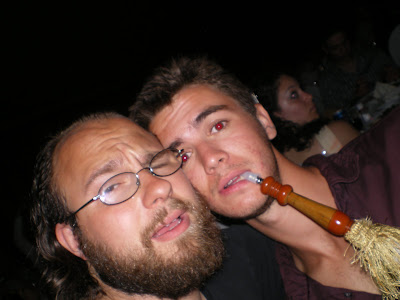
As we grazed on the excellent meze, Sami told us a little more about himself. He was from the same village as Bashar Assad, the Syrian President, and was also from the same family. They had cousins in common. The way you can tell the members of the Assad family is from their eyes. Only the members of Assad's family from that particular village have blue eyes. All other Syrians have brown eyes. Sami told us that Bashar is a great practical joker and loves a laugh. From the millions of portraits of him glaring down from every available surface in Syria, you'd never have guessed. Sami wanted me to stay in Lattakia and hang out. He told me to forget Damascus. He told me to call my wife and have her fly out. He told me I shouldn't go home. For some reason, I couldn't help but pick up on an undertone of power in his entreaties. This guy wasn't a farmer. When I asked around about him later, people simply shrugged and said that nobody knows what he did, but most likely the secret police. All I know is that he was a flawlessly generous host, an excellent dancer and a very funny guy when drunk, something he claimed he only did one night a week.
Meat arrived on great sizzling platters. Bread, salad and hummus was refilled. We ate until we were fit to burst. The band kicked up a notch and soon the dance floor was filled with young Syrians in trendy clothes, snapping their fingers and strutting their stuff. Sami and his wife cut a rug real nice as well. Grace and I even managed to get Sam in all his Englishness to take to the dance floor and convulse enthusiastically in a close approximation of being in time.
At the end of the evening, the band left, the lights came up and the revellers simply took the instruments from the stage and began playing by themselves, singing and dancing around their tables. I got behind the drum kit and jammed along to a few Syrian folk numbers. When I got up to leave, I noticed that I had been dancing so vigorously in my flip-flops that I had cut my foot in several places and was bleeding quite badly.
Sami dropped Sam, Grace and I back at the hotel and bid us good night. I collapsed into bed, a third of a litre of scotch the worse for wear and dreading the hangover to come.
Day 18: Baalbek/Lattakia, Syria - "I know this is a visa. But you still need a visa."
Captain Libya and Kris left first thing in the morning for Beirut. I enjoyed a wholesome shwarma breakfast and then Mohammed gave me a lift to the bus station. A minibus was headed for the border. At the border I would have to walk into Syria and then get a bus on the Syrian side to Homs, a hub city where I would find a connection to Lattakia.
The ride to the border was uneventful, other than the strange feeling of surfacing for air as we drove up and out of the Bekaa Valley, leaving behind the Shia posters, portraits of Khomeini and Hezbollah flags. I had felt no threat in Baalbek and in fact had been made very welcome by everyone. However, when we were leaving, as the propaganda fell away I just felt as if an oppressive atmosphere was dispersing. No matter how cheerful the people, when you know that their idea of a good time is a Shia state enforcing strict Sharia law where music is illegal and women have to be covered, it colours your discourse with them, even on a subconscious level.
We arrived at the Lebanese border and I got through with very little difficulty. Getting back into Syria was to prove another matter altogether. I was told when leaving Syria that I would be able to re-enter the country from Lebanon even though my visa was only a single-entry. At the border, I waited placidly amidst the chaos of men perched on stacks of building materials shouting and smoking, spilling ashes on me, leaning over me, throwing passports and visa stamps at the officers behind the glass in an attempt to get taken care of first. I got my passport to a chubby, moustachioed guy in uniform who put it to one side. I motioned solicitously to him several times but he had his own system and eventually my passport was opened forty-five minutes later.
Once opened, my passport sat limply in his hand for a further half-hour before he actually looked at it. He flipped through it once, twice, thrice, an increasingly perplexed expression on his face. My heart sank. He looked at me and said something in Arabic. I said I only spoke English. A hunched over priest wearing a beanie and holding a Swiss passport was by my side. I asked him to translate. He Swissed me. A Syrian guy on my other side took up my cause, shouted at the guard, listened, shouted again, listened again and then told me the bad news.
"You need a visa."
"But I have a visa."
The guy said something to the guard. He held out the passport. I flipped to my Syrian visa and pointed at it, saying the word visa over and over. I felt like a character from Quest for Fire or Clan of the Cave Bear. The guard looked at my Syrian visa and then spoke to my impromptu translator. My translator turned to me.
"I know this is a visa. But you still need a visa."
What?
It transpired that my Syrian visa, because it was a single-entry, would not get me back into Syria. I had to go to the bank to buy Syrian money ($52 worth), then go to the visa stamp desk to buy the visa stamps, then come back and have the stamps put into my passport and accredited. I headed for the bank.
The bank was a single room hut about fifty yards from the passport office. A man stood hunched behind filthy glass, chain-smoking. I showed him my passport, said the word visa and then the words "fifty-two dollars". He nodded and held out his hand. I gave him a 50 euro note. He typed on his keyboard, looked at the screen, opened drawers and generally gave me the impression that he was cloning a sheep in there. At the end of the process he handed me 2400 Syrian pounds.
Now, for those of you who, gee whizz, DON'T know the exchange rate, the euro/Syrian rate is 1:70. 50 euro is 3500 Syrian pounds, not 2400. I did a quick sum in my head and figured out the problem. Fuckpants McGee in there had changed my euros at the dollar rate. I waved the wad of Syrian at the glass and demanded more. He looked at me blankly. I spoke in English, he spoke in Arabic. Eventually he called off to one side and a young guy came up to me. He spoke English, albeit with a heavily limited vocabulary.
"Problem?"
I explained.
"No good. Wait."
He spoke rapidly to Fuckpants McGee. Fuckpants shouted in Arabic. I grabbed the calculator and told him to get a fifty dollar and a fifty euro note. He complied. I waved the euro bill and typed in the exchange rate on the calculator. Then I waved the dollar bill and typed in the dollar rate. Then I waved my too-small stack of Syrian money. Then I waved my hands in front of me in the universal gesture for "there you go, bitch, explain that". He clicked his tongue, lit a cigarette and had an idea. He took back the Syrian money and began typing on the keyboard again. The guy who spoke some English invited me into the anteroom to drink tea while we waited. The anteroom was a bare concrete cell with two single beds in it. These guys lived in the bank. I drank tea and waited for the next stage of the negotiations.
After about half an hour in the bank, Fuckpants succeeded in explaining to me that the first exchange was an honest mistake and that he needed to change my euros in two stages, first the exact amount for the visa which would be given to me with one receipt and then the balance, which would come with a separate receipt. This, he explained, was because the visa guy would issue my visa stamp to the amount on the receipt, not an arbitrary amount that I told him. I was gripping my tea glass as hard as I could to avoid hurling it into his benevolently explanatory face. I left, eventually, with two receipts and the right amount of money.
Visa Guy sold me my stamps without a hitch and I was back in the scrum at the passport office within seconds. I found another good-natured Syrian to shout on my behalf and, after filling in another form, waiting another half-hour, gesturing wildly to several men with guns and threatening to slap the Swiss priest in the beanie, I had a valid Syrian visa and was free to re-enter Syria. Kaloo-kallay. It had taken me about two and a half hours.
I got a minibus from the border to the Al-Kadmous bus stop in Homs, a dreadful dusty little outpost with nothing to recommend it other than a mediocre shwarma-teria and exquisite baklava dispensed by a charmingly rotund man with a world-beating combover. Within the hour I was on a bus to Lattakia.
I arrived at the Safwan Hotel in Lattakia like a prodigal son. Mohammed, his crazy uncle and the other characters all gave me hugs and asked after CL and our Lebanese exploits. I sat chatting with them and a few fellow travellers in the reception of the hotel until late. One of the topics, broached by a friend of Mohammed's, a benign but sleazy little number with slightly too-perfect hair, John Lennon glasses and a very cheerfully self-deprecating demeanour, was that of the trend of re-hymenisation in Syria and other Arab countries. Apparently, our little friend was saying, it is very common for Arab girls who want to have sex to have an operation that places a fresh membrane over the vaginal opening where the hymen once was. They have the operation before their wedding and it provides them a stress-free wedding night. Nick, one of the travellers in the reception, added that where he lives in Turkey, it is a very delicate matter because doctors who perform the operation often use their knowledge of the patient's sexual activity to blackmail the girls after they've replaced the hymen. These re-virginised girls have to look long and hard for a doctor that is both willing to perform the operation, which is illegal without parental consent, and trustworthy enough to have sensitive details about the girls without abusing them.
On that note, I decided it was time for me to retreat to my boudoir for a good night's sleep.
The ride to the border was uneventful, other than the strange feeling of surfacing for air as we drove up and out of the Bekaa Valley, leaving behind the Shia posters, portraits of Khomeini and Hezbollah flags. I had felt no threat in Baalbek and in fact had been made very welcome by everyone. However, when we were leaving, as the propaganda fell away I just felt as if an oppressive atmosphere was dispersing. No matter how cheerful the people, when you know that their idea of a good time is a Shia state enforcing strict Sharia law where music is illegal and women have to be covered, it colours your discourse with them, even on a subconscious level.
We arrived at the Lebanese border and I got through with very little difficulty. Getting back into Syria was to prove another matter altogether. I was told when leaving Syria that I would be able to re-enter the country from Lebanon even though my visa was only a single-entry. At the border, I waited placidly amidst the chaos of men perched on stacks of building materials shouting and smoking, spilling ashes on me, leaning over me, throwing passports and visa stamps at the officers behind the glass in an attempt to get taken care of first. I got my passport to a chubby, moustachioed guy in uniform who put it to one side. I motioned solicitously to him several times but he had his own system and eventually my passport was opened forty-five minutes later.
Once opened, my passport sat limply in his hand for a further half-hour before he actually looked at it. He flipped through it once, twice, thrice, an increasingly perplexed expression on his face. My heart sank. He looked at me and said something in Arabic. I said I only spoke English. A hunched over priest wearing a beanie and holding a Swiss passport was by my side. I asked him to translate. He Swissed me. A Syrian guy on my other side took up my cause, shouted at the guard, listened, shouted again, listened again and then told me the bad news.
"You need a visa."
"But I have a visa."
The guy said something to the guard. He held out the passport. I flipped to my Syrian visa and pointed at it, saying the word visa over and over. I felt like a character from Quest for Fire or Clan of the Cave Bear. The guard looked at my Syrian visa and then spoke to my impromptu translator. My translator turned to me.
"I know this is a visa. But you still need a visa."
What?
It transpired that my Syrian visa, because it was a single-entry, would not get me back into Syria. I had to go to the bank to buy Syrian money ($52 worth), then go to the visa stamp desk to buy the visa stamps, then come back and have the stamps put into my passport and accredited. I headed for the bank.
The bank was a single room hut about fifty yards from the passport office. A man stood hunched behind filthy glass, chain-smoking. I showed him my passport, said the word visa and then the words "fifty-two dollars". He nodded and held out his hand. I gave him a 50 euro note. He typed on his keyboard, looked at the screen, opened drawers and generally gave me the impression that he was cloning a sheep in there. At the end of the process he handed me 2400 Syrian pounds.
Now, for those of you who, gee whizz, DON'T know the exchange rate, the euro/Syrian rate is 1:70. 50 euro is 3500 Syrian pounds, not 2400. I did a quick sum in my head and figured out the problem. Fuckpants McGee in there had changed my euros at the dollar rate. I waved the wad of Syrian at the glass and demanded more. He looked at me blankly. I spoke in English, he spoke in Arabic. Eventually he called off to one side and a young guy came up to me. He spoke English, albeit with a heavily limited vocabulary.
"Problem?"
I explained.
"No good. Wait."
He spoke rapidly to Fuckpants McGee. Fuckpants shouted in Arabic. I grabbed the calculator and told him to get a fifty dollar and a fifty euro note. He complied. I waved the euro bill and typed in the exchange rate on the calculator. Then I waved the dollar bill and typed in the dollar rate. Then I waved my too-small stack of Syrian money. Then I waved my hands in front of me in the universal gesture for "there you go, bitch, explain that". He clicked his tongue, lit a cigarette and had an idea. He took back the Syrian money and began typing on the keyboard again. The guy who spoke some English invited me into the anteroom to drink tea while we waited. The anteroom was a bare concrete cell with two single beds in it. These guys lived in the bank. I drank tea and waited for the next stage of the negotiations.
After about half an hour in the bank, Fuckpants succeeded in explaining to me that the first exchange was an honest mistake and that he needed to change my euros in two stages, first the exact amount for the visa which would be given to me with one receipt and then the balance, which would come with a separate receipt. This, he explained, was because the visa guy would issue my visa stamp to the amount on the receipt, not an arbitrary amount that I told him. I was gripping my tea glass as hard as I could to avoid hurling it into his benevolently explanatory face. I left, eventually, with two receipts and the right amount of money.
Visa Guy sold me my stamps without a hitch and I was back in the scrum at the passport office within seconds. I found another good-natured Syrian to shout on my behalf and, after filling in another form, waiting another half-hour, gesturing wildly to several men with guns and threatening to slap the Swiss priest in the beanie, I had a valid Syrian visa and was free to re-enter Syria. Kaloo-kallay. It had taken me about two and a half hours.
I got a minibus from the border to the Al-Kadmous bus stop in Homs, a dreadful dusty little outpost with nothing to recommend it other than a mediocre shwarma-teria and exquisite baklava dispensed by a charmingly rotund man with a world-beating combover. Within the hour I was on a bus to Lattakia.
I arrived at the Safwan Hotel in Lattakia like a prodigal son. Mohammed, his crazy uncle and the other characters all gave me hugs and asked after CL and our Lebanese exploits. I sat chatting with them and a few fellow travellers in the reception of the hotel until late. One of the topics, broached by a friend of Mohammed's, a benign but sleazy little number with slightly too-perfect hair, John Lennon glasses and a very cheerfully self-deprecating demeanour, was that of the trend of re-hymenisation in Syria and other Arab countries. Apparently, our little friend was saying, it is very common for Arab girls who want to have sex to have an operation that places a fresh membrane over the vaginal opening where the hymen once was. They have the operation before their wedding and it provides them a stress-free wedding night. Nick, one of the travellers in the reception, added that where he lives in Turkey, it is a very delicate matter because doctors who perform the operation often use their knowledge of the patient's sexual activity to blackmail the girls after they've replaced the hymen. These re-virginised girls have to look long and hard for a doctor that is both willing to perform the operation, which is illegal without parental consent, and trustworthy enough to have sensitive details about the girls without abusing them.
On that note, I decided it was time for me to retreat to my boudoir for a good night's sleep.
Day 17: Deir Qannoubine/Baalbek - "Hezbollah gave me free batteries!"
The sun woke me up. At my feet lay the valley and the mountain on the other side of it. 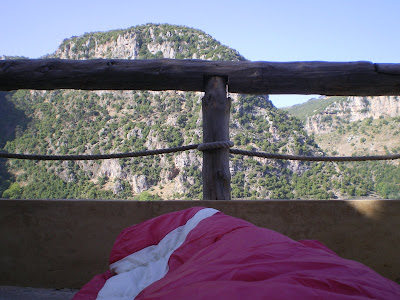 I got up, dressed and admired the view from my "bedroom".
I got up, dressed and admired the view from my "bedroom".
The other guys were up and packing their gear. We ate another can of hummus and another can of luncheon meat. Last night had not been an abberation. The breakfast was as abysmal as the dinner. Horror.
We picked our way up the side of the mountain, pressing upwards at an average angle of 60% or so. CL and Kris were in decent shape and pressed on. After the first ten minutes I looked like I had just stepped out of a shower. Absolutely drenched in sweat, I stumbled and wheezed my way up the mountainside. The views were spectacular.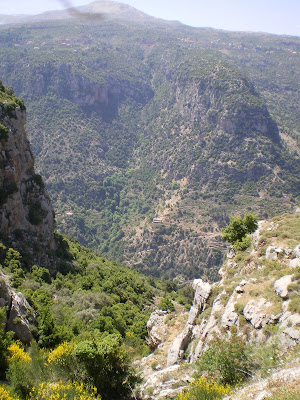 The path up the mountain let out into someone's back yard. We paused there to get our breath and drink some water. A man sitting by his garage told us we were 7km from Bcharre. That made sense, since we had left Bcharre to come this way. Now we had to walk back.
The path up the mountain let out into someone's back yard. We paused there to get our breath and drink some water. A man sitting by his garage told us we were 7km from Bcharre. That made sense, since we had left Bcharre to come this way. Now we had to walk back.
We got to the church in the centre of Bcharre town at a touch before 13:00. We made it known that we were headed for Baalbek and after a flurry of negotiations, we had a taxi for LL50,000 (25 euros). There are no bus or minibus services to Baalbek from Bcharre. The taxi ride would take us from Bcharre in the centre of the Kadisha Valley back up to the Cedars and then over the top of the snowy mountains there into the Bekaa Valley. Baalbek is venerated as one of the most ancient cities in the world and has one of the best preserved temples in existence.
After passing the Cedars, the taxi climbed up and up into the clouds. The green of the Kadisha Valley gave way to the brown rocks and dust of the mountains. Driving over the pass between the peaks, the road was lined with snow, sometimes as high as six or seven feet on either side.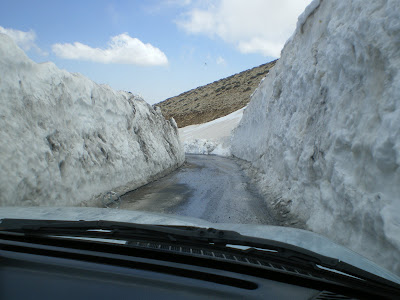 This road is impassable in winter. The snow that remained ended cleanly at the road where plows had cleared the way for spring traffic. We reached the top of the mountain range that separates the Bekaa and Kadisha Valleys.
This road is impassable in winter. The snow that remained ended cleanly at the road where plows had cleared the way for spring traffic. We reached the top of the mountain range that separates the Bekaa and Kadisha Valleys. 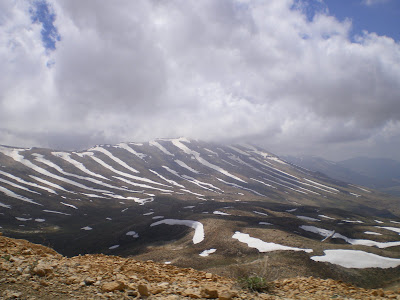 The taxi stopped and we got out to take pictures of the incredible views. The wind was brutal and cold.
The taxi stopped and we got out to take pictures of the incredible views. The wind was brutal and cold. 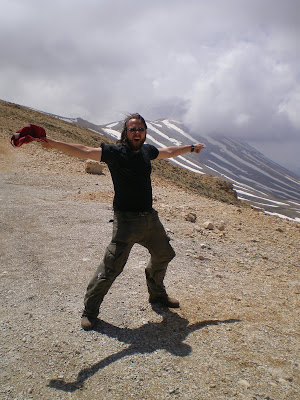 It has been a steamy 26C in the Kadisha Valley earlier but now, a scant forty-five minute drive away, it was closer to 12C, less with the wind. We were parked at the highest peak. The clouds were level with us and in some places lower. To the right of us were a series of snow-capped peaks wreathed in clouds. The road, lined with snow, stretched away into the distance. The mountainsides were sheer, a dusty orange red and fell away to reveal a seemingly endless expanse of desolate desert, broken only by the occasional lonely homestead. Pictures in hand, we piled back into the cab and proceeded to Baalbek, home of the fabled ruins of old and also the heart of Hezbollah's Shia support base.
It has been a steamy 26C in the Kadisha Valley earlier but now, a scant forty-five minute drive away, it was closer to 12C, less with the wind. We were parked at the highest peak. The clouds were level with us and in some places lower. To the right of us were a series of snow-capped peaks wreathed in clouds. The road, lined with snow, stretched away into the distance. The mountainsides were sheer, a dusty orange red and fell away to reveal a seemingly endless expanse of desolate desert, broken only by the occasional lonely homestead. Pictures in hand, we piled back into the cab and proceeded to Baalbek, home of the fabled ruins of old and also the heart of Hezbollah's Shia support base.
The taxi dropped us outside the ruins. We were immediately set upon by a lone tout offering Hezbollah t-shirts and flags. The town was deserted apart from the locals going about their business. Hotel and cafe owners lounged dispiritedly on the steps of their establishments. Three days before we arrived in Baalbek, the hotels had been full and the shops and cafes were doing a roaring trade. Touts couldn't price their t-shirts and flags high enough and the stream of tourists was gearing up for the always profitable summer season. Now, we were the only game in town.
We dumped our stuff at the Hotel Shouman, run by the sweet-natured but weirdly apologetic Mohammed Shouman. He showed us his booking chart. Like an eraser had been run down the page, all the names ended three days before. He offered us the best room in the hotel with a great view of the ruins. Then he knocked LL3,000 off the price. Three days before he hadn't even had a room going spare. Now he was virtually begging us to stay at his place as opposed to someone else's.
We set off for the ruins. To Captain Libya's chagrin, they are the only ruins in Lebanon that don't offer student discounts. We paid our money and went in. With the exception of the security guard who had brought his kids to work with him, we were the only people there. It was amazing. Legends surrounding the ruins at Baalbek describe their use as anything from temples to Jupiter and Bacchus to altars of blood sacrifice and wild Roman orgies. The disorganisation of the ruins was refreshing. Stones lie where they fell, strewn around the grounds as if by a giant hand. You can walk, climb and sit where you want and whatever the angle, the view is always rewarding and exotic. The remains of the unfinished temple of Jupiter, columns jutting up like ribs, stand in the centre of the complex. Radiating out from there are courtyards, buildings, staircases, hidden passages that dead end in stone corners and the mind-blowing structure that the plaques refer to as a temple of Bacchus.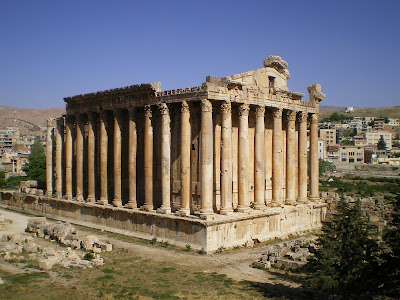 Purportedly used for drinking and orgies in ancient times, then used as a dungeon in the Middle Ages, whatever the purpose or provenance it is a spectacular building. Complete in every way except for the roof and internal furniture, sitting in the centre of the temple was like travelling back in time. The absence of tourists, children and school groups made it all the more pleasurable.
Purportedly used for drinking and orgies in ancient times, then used as a dungeon in the Middle Ages, whatever the purpose or provenance it is a spectacular building. Complete in every way except for the roof and internal furniture, sitting in the centre of the temple was like travelling back in time. The absence of tourists, children and school groups made it all the more pleasurable.
Like the ruins and temples of Egypt, Baalbek is marked with graffiti that provides a kind of historical record all its own. Carvings of names and countries as far back as 1861 add a certain well-tramped cheapness to the ruins that make them more lovable. Somehow, the idea that our generation isn't the first to desecrate works of art with self-referential scribbling is very comforting. Another curiosity is why the graffiti only goes back to 1861 if the ruins have been here for so long. Maybe graffiti was invented in 1861. Who knew?
After finishing our exploration of the ruins, we returned to the hotel where Mohammed was waiting with an offer we simply could not refuse.
"Big stone?" Mohammed asked hopefully, jiggling his car keys enticingly.
CL, Kris and I looked at each other. "What?"
"Big stone," Mohammed elaborated, nodding encouragingly. "Biggest in the world."
There was an awkward pause.
"You want to see? We can take my car."
CL and Kris were still unconvinced but I was all over that like a cheap suit. Moments later we were in Mohammed's ancient Mercedes on our way to see the self-proclaimed Biggest Stone in the World. Upon arriving there, two things became very clear. First, this stone was very, very, very big. Secondly, it seemed a little too small to be the biggest in the world, but the look of pride on Mohammed's face forced me into exaggerated appreciations of its size.
"Wow!" I cried. "That's a big fucking stone!"
Mohammed beamed. I motioned at CL and Kris.
"Yeah," they added, looking at each other and then me. "That's really big. I've never seen a stone that big." etc.
Pictures were taken of each of us in various "hilarious" poses - "lifting" the stone, being "crushed" by the stone. Eventually, even Mohammed's enthusiasm was waning and we pressed on.
On the way back in the car, we spotted a beautiful blue mosque, built in the Shia style most popularly exhibited in Iran. I asked Mohammed if we could have a look. He parked, walked through the gate, spoke to the guards and came back to us. We would be allowed access to the mosque. I asked why we needed special permission. He explained that this was a Hezbollah mosque, built with Iranian funding. The mosque grounds also played host to that most fabled of creatures, the white whale that Captain Libya and I had sought throughout our visit to Lebanon - the Hezbollah Gift Shop.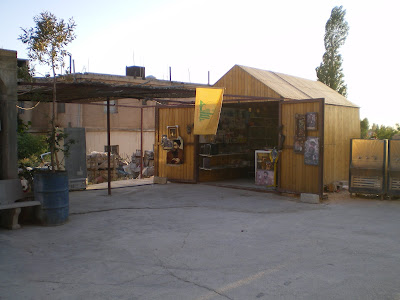 Was it open? You betzler.
Was it open? You betzler.
The mosque was exquisite inside, hung with crystal chandeliers, the light from the setting sun casting tall beams of lights across the thick carpet. The walls and ceilings were a mosaic of coloured tiles and tiny mirrors, giving the entire room a disco ball effect that was quite something.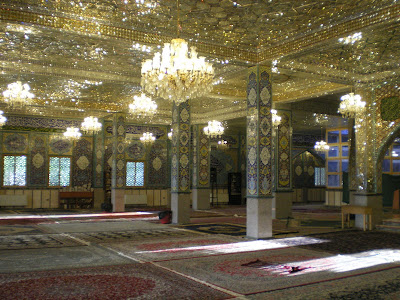 The centre of the room was given over to a shrine that glowed with a green light. In the shrine was a coffin. Mohammed introduced a member of Hezbollah named Ali who explained the coffin to us. The coffin, as far as his limited English could convey, was the coffin of a child martyr and the mosque as a whole was dedicated to the children of Fatima. Later, in Damascus, I would see the same filigreed cage filled with green light, the same draped coffin, the same money strewn over the top, in the Ummayad Mosque.
The centre of the room was given over to a shrine that glowed with a green light. In the shrine was a coffin. Mohammed introduced a member of Hezbollah named Ali who explained the coffin to us. The coffin, as far as his limited English could convey, was the coffin of a child martyr and the mosque as a whole was dedicated to the children of Fatima. Later, in Damascus, I would see the same filigreed cage filled with green light, the same draped coffin, the same money strewn over the top, in the Ummayad Mosque.
Ali walked us around the mosque, pointing out features and answering our questions either in broken English or through Mohammed as an equally bad interpreter. Around Ali's neck was a huge necklace in the shape of a scimitar, inscribed with the name of the Prophet Ali and a prayer in his name.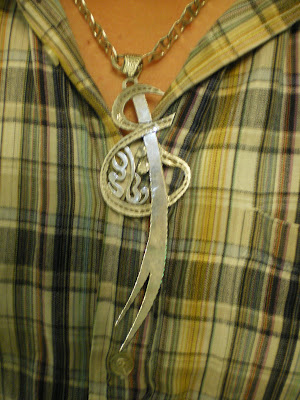 These necklaces are apparently very popular. The Hezbollah Gift Shop sells loads of them.
These necklaces are apparently very popular. The Hezbollah Gift Shop sells loads of them.
In the corner of the mosque was a pulpit made of plain wood. Embossed onto the front in brass was the Hezbollah logo. We were allowed to pose for photographs behind the pulpit, making various intense facial expressions and gestures, as Ali and Mohammed looked on, bemused.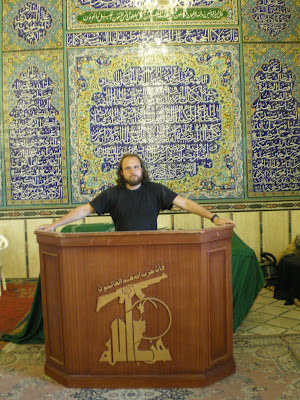 After all of our poses had been committed to digital celluloid for posterity, we repaired to the courtyard where, in the warmth of the dwindling sun, we descended on the Hezbollah Gift Shop like package tourists docking at Aswan in the summer.
After all of our poses had been committed to digital celluloid for posterity, we repaired to the courtyard where, in the warmth of the dwindling sun, we descended on the Hezbollah Gift Shop like package tourists docking at Aswan in the summer.
One wall held a DVD rack. DVDs of Hassan Nasrullah (the leader of Hezbollah) giving speeches were side by side with documentaries about the Party of God.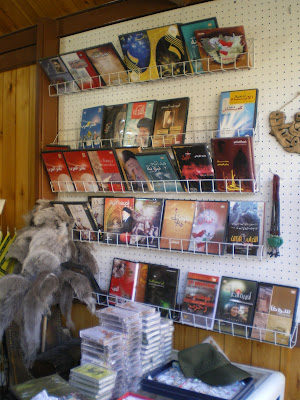 Nestled in amongst these more innocuous offerings was a two and a half hour compilation of videos of suicide bombings carried out against Israel. I asked Ali about it. He grinned widely and made a pushing-away gesture with his hands coupled to sound of an explosion.
Nestled in amongst these more innocuous offerings was a two and a half hour compilation of videos of suicide bombings carried out against Israel. I asked Ali about it. He grinned widely and made a pushing-away gesture with his hands coupled to sound of an explosion.
"Yisrael," he grinned. "Boom."
The DVD cost LL40,000, just under 20 euros. Apparently it sells very well but mostly to visiting Arabs and dignitaries. The locals and members of the Hez just watch the re-runs on Al-Manar, the Hezbollah TV channel.
Across from the DVD rack were rows of shelves with stacks and stacks of audio tapes. Being Shia, Hezbollah don't listen to music apart from military marches, so the existence of the tapes fascinated me. I was told that they were speeches by Nasrullah and Khomeini. On the shelf above the tapes were the special brocade hats that Hezbollah members wear, stacked next to Winnie the Pooh and Strawberry Shortcake hats.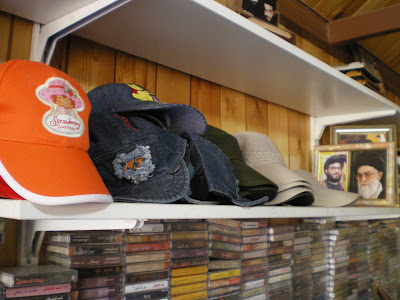 I pointed at the Pooh hat and looked at Ali askance. He held his hand out, palm down, at waist height and shrugged. You know, for kids.
I pointed at the Pooh hat and looked at Ali askance. He held his hand out, palm down, at waist height and shrugged. You know, for kids.
Books, keyrings, necklaces, tapes, photographs, posters, woodcuts - nothing was beyond the scope of the Hezbollah Gift Shop.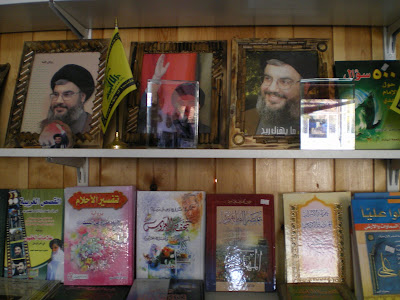 This was not a bunch of bearded crazies in the hills with weapons from Iran. These guys have a radio station, a TV station, a merchandising line, a corporate philosophy. To appropriate a Madison Avenue term, they're "sexy".
This was not a bunch of bearded crazies in the hills with weapons from Iran. These guys have a radio station, a TV station, a merchandising line, a corporate philosophy. To appropriate a Madison Avenue term, they're "sexy".
I asked Ali what their bestseller was. He asked to who. I asked him to tell me the best seller to the Shia mosque-goers and the best seller to Hezbollah members. The discerning Shia mosque-goer in Baalbek likes the look of the scimitar necklace inscribed with Ali's name and prayer. They like it equally in silver and in retro woodcut. The Hezbollah member-about-town, on the other hand, fancies a much more prosaic object. The most popular seller to members of Hezbollah is a keyring/mobile phone lanyard that is solar-activated, flashing an image of Nasrullah and the Hezbollah logo when exposed to sunlight. In true globalist fashion, it is also the only product in the gift shop that is not made in Lebanon. It is Made in China.
The attitude that Ali affected once behind the counter was not that of a zealot by any stretch of the imagination, but rather the same approach as any salesman I've ever met. He forced me to try on a hat and then clucked and flapped his hands about how good I look, even taking a picture of me on his phone and showing it to me since there was no mirror to hand. He tried to upsell CL and myself, but in the end only shifted a couple of keyrings. As we took our leave, there were handshakes all round and cheerful waves as we made our way back to the car. On the way out, I noticed a massive mosaic of Khomeini and Khamenei waving to the masses. The backdrop was the Al-Aqsa mosque in Jerusalem.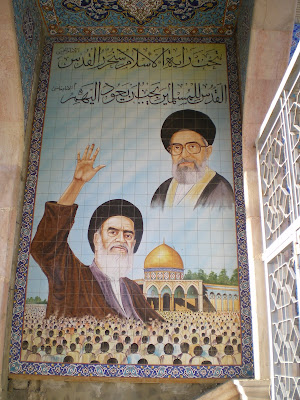 I looked back at the gift shop. Ali stood in the entrance, waving cheerfully. A passing Hezbollah member shook our hands, politely asked where we were from and then gave us some fruit he had just picked.
I looked back at the gift shop. Ali stood in the entrance, waving cheerfully. A passing Hezbollah member shook our hands, politely asked where we were from and then gave us some fruit he had just picked.
We asked Mohammed to drop us a couple of blocks before the hotel so that we could go for a stroll. CL and I wanted to take pictures of the numerous posters and billboards decrying the martyrdom of the Hezbollah Number Two, recently assasinated by the Israelis.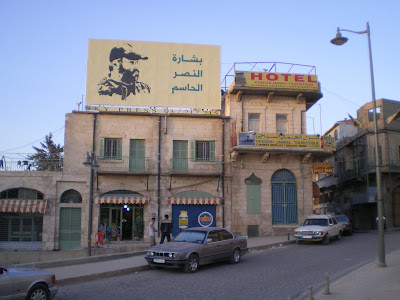 I was struck by his resemblance to Omar Bakri, the Syrian citizen recently deported from Britain for exhorting the young Muslim population to become martyrs. There was also a touch of the bearded Alexei Sayle about him.
I was struck by his resemblance to Omar Bakri, the Syrian citizen recently deported from Britain for exhorting the young Muslim population to become martyrs. There was also a touch of the bearded Alexei Sayle about him.
We found a quiet shwarma joint and ate our dinner, surrounded by young men wearing Hezbollah gear, eating and watching the news. When Hariri appeared on the screen, giving a speech denouncing Hezbollah's actions, half the clientele of the shop walked out. On the table, pushed up against the wall, was a small plastic mosque with a slot to donate money to the cause. When you put money in, it played a short burst of the call to prayer. I looked around. There was one on every table.
Night had fallen while we had been eating. On our way back to the hotel, we saw a couple of young girls standing on a street corner. In contrast to all the other women we had seen here in this very religious Shia town, they were clad in tight jeans and strap tops. As we passed by their corner on the other side of the street, a car pulled up and one of them walked to the window. She leaned down, spoke to the driver for a moment and then waved her friend over. They both got in and the car drove off. Now, I'm not saying they were hookers, but...
Captain Libya and I settled down at the hotel to read our books. Kris went out for a brief stroll. He was gone for over an hour. When he got back he was very excited.
"Hezbollah gave me free batteries!" he cried jubilantly.
We enquired as to the provenance of the said boon.
Kris had been walking down the street. A guy came up to him and asked him where he was from. He said Poland. The guy asked him what he did for a living. Kris gave him some answer or other. As the questions continued, more and more guys arrived until Kris realised he was surrounded by thirty or so very stern but friendly guys, some of whom were packing heat. They asked if he had a camera. He replied in the affirmative. They asked if he had taken any pictures in Baalbek. He again said that he had. They asked to see the pictures. Now, wouldn't you know it, but Kris's camera batteries had just died and were back at the hotel charging. The Hezbollah guys went and got him AA batteries. The first set were piss weak and Kris said he wanted proper batteries. The Hezbollah guy apologised and returned a few minutes later with a known brand. They fired up Kris's camera, checked his pictures, gave him back his camera, offered him a soft drink, chatted for a few minutes and disappeared. Kris had burned rubber back to the hotel to share the story.
We talked for a while about how strange it was, this gulf between what these people really did and the way they acted to people they didn't perceive as a threat. It was not necessarily a surprise that they behaved politely, but the level of suspicion was so low as to be almost unnoticeable and as for aggression, we had not been on the receiving end of even a dark glance, let alone a raised voice.
The following day, Kris and CL were off to Beirut. I would be returning to Syria, to Lattakia and from there to Damascus. We dozed off, our heads full of Hezbollah souvenirs, polite gunmen and the possibilities of tomorrow.
The other guys were up and packing their gear. We ate another can of hummus and another can of luncheon meat. Last night had not been an abberation. The breakfast was as abysmal as the dinner. Horror.
We picked our way up the side of the mountain, pressing upwards at an average angle of 60% or so. CL and Kris were in decent shape and pressed on. After the first ten minutes I looked like I had just stepped out of a shower. Absolutely drenched in sweat, I stumbled and wheezed my way up the mountainside. The views were spectacular.
We got to the church in the centre of Bcharre town at a touch before 13:00. We made it known that we were headed for Baalbek and after a flurry of negotiations, we had a taxi for LL50,000 (25 euros). There are no bus or minibus services to Baalbek from Bcharre. The taxi ride would take us from Bcharre in the centre of the Kadisha Valley back up to the Cedars and then over the top of the snowy mountains there into the Bekaa Valley. Baalbek is venerated as one of the most ancient cities in the world and has one of the best preserved temples in existence.
After passing the Cedars, the taxi climbed up and up into the clouds. The green of the Kadisha Valley gave way to the brown rocks and dust of the mountains. Driving over the pass between the peaks, the road was lined with snow, sometimes as high as six or seven feet on either side.
The taxi dropped us outside the ruins. We were immediately set upon by a lone tout offering Hezbollah t-shirts and flags. The town was deserted apart from the locals going about their business. Hotel and cafe owners lounged dispiritedly on the steps of their establishments. Three days before we arrived in Baalbek, the hotels had been full and the shops and cafes were doing a roaring trade. Touts couldn't price their t-shirts and flags high enough and the stream of tourists was gearing up for the always profitable summer season. Now, we were the only game in town.
We dumped our stuff at the Hotel Shouman, run by the sweet-natured but weirdly apologetic Mohammed Shouman. He showed us his booking chart. Like an eraser had been run down the page, all the names ended three days before. He offered us the best room in the hotel with a great view of the ruins. Then he knocked LL3,000 off the price. Three days before he hadn't even had a room going spare. Now he was virtually begging us to stay at his place as opposed to someone else's.
We set off for the ruins. To Captain Libya's chagrin, they are the only ruins in Lebanon that don't offer student discounts. We paid our money and went in. With the exception of the security guard who had brought his kids to work with him, we were the only people there. It was amazing. Legends surrounding the ruins at Baalbek describe their use as anything from temples to Jupiter and Bacchus to altars of blood sacrifice and wild Roman orgies. The disorganisation of the ruins was refreshing. Stones lie where they fell, strewn around the grounds as if by a giant hand. You can walk, climb and sit where you want and whatever the angle, the view is always rewarding and exotic. The remains of the unfinished temple of Jupiter, columns jutting up like ribs, stand in the centre of the complex. Radiating out from there are courtyards, buildings, staircases, hidden passages that dead end in stone corners and the mind-blowing structure that the plaques refer to as a temple of Bacchus.
Like the ruins and temples of Egypt, Baalbek is marked with graffiti that provides a kind of historical record all its own. Carvings of names and countries as far back as 1861 add a certain well-tramped cheapness to the ruins that make them more lovable. Somehow, the idea that our generation isn't the first to desecrate works of art with self-referential scribbling is very comforting. Another curiosity is why the graffiti only goes back to 1861 if the ruins have been here for so long. Maybe graffiti was invented in 1861. Who knew?
After finishing our exploration of the ruins, we returned to the hotel where Mohammed was waiting with an offer we simply could not refuse.
"Big stone?" Mohammed asked hopefully, jiggling his car keys enticingly.
CL, Kris and I looked at each other. "What?"
"Big stone," Mohammed elaborated, nodding encouragingly. "Biggest in the world."
There was an awkward pause.
"You want to see? We can take my car."
CL and Kris were still unconvinced but I was all over that like a cheap suit. Moments later we were in Mohammed's ancient Mercedes on our way to see the self-proclaimed Biggest Stone in the World. Upon arriving there, two things became very clear. First, this stone was very, very, very big. Secondly, it seemed a little too small to be the biggest in the world, but the look of pride on Mohammed's face forced me into exaggerated appreciations of its size.
"Wow!" I cried. "That's a big fucking stone!"
Mohammed beamed. I motioned at CL and Kris.
"Yeah," they added, looking at each other and then me. "That's really big. I've never seen a stone that big." etc.
Pictures were taken of each of us in various "hilarious" poses - "lifting" the stone, being "crushed" by the stone. Eventually, even Mohammed's enthusiasm was waning and we pressed on.
On the way back in the car, we spotted a beautiful blue mosque, built in the Shia style most popularly exhibited in Iran. I asked Mohammed if we could have a look. He parked, walked through the gate, spoke to the guards and came back to us. We would be allowed access to the mosque. I asked why we needed special permission. He explained that this was a Hezbollah mosque, built with Iranian funding. The mosque grounds also played host to that most fabled of creatures, the white whale that Captain Libya and I had sought throughout our visit to Lebanon - the Hezbollah Gift Shop.
The mosque was exquisite inside, hung with crystal chandeliers, the light from the setting sun casting tall beams of lights across the thick carpet. The walls and ceilings were a mosaic of coloured tiles and tiny mirrors, giving the entire room a disco ball effect that was quite something.
Ali walked us around the mosque, pointing out features and answering our questions either in broken English or through Mohammed as an equally bad interpreter. Around Ali's neck was a huge necklace in the shape of a scimitar, inscribed with the name of the Prophet Ali and a prayer in his name.
In the corner of the mosque was a pulpit made of plain wood. Embossed onto the front in brass was the Hezbollah logo. We were allowed to pose for photographs behind the pulpit, making various intense facial expressions and gestures, as Ali and Mohammed looked on, bemused.
One wall held a DVD rack. DVDs of Hassan Nasrullah (the leader of Hezbollah) giving speeches were side by side with documentaries about the Party of God.
"Yisrael," he grinned. "Boom."
The DVD cost LL40,000, just under 20 euros. Apparently it sells very well but mostly to visiting Arabs and dignitaries. The locals and members of the Hez just watch the re-runs on Al-Manar, the Hezbollah TV channel.
Across from the DVD rack were rows of shelves with stacks and stacks of audio tapes. Being Shia, Hezbollah don't listen to music apart from military marches, so the existence of the tapes fascinated me. I was told that they were speeches by Nasrullah and Khomeini. On the shelf above the tapes were the special brocade hats that Hezbollah members wear, stacked next to Winnie the Pooh and Strawberry Shortcake hats.
Books, keyrings, necklaces, tapes, photographs, posters, woodcuts - nothing was beyond the scope of the Hezbollah Gift Shop.
I asked Ali what their bestseller was. He asked to who. I asked him to tell me the best seller to the Shia mosque-goers and the best seller to Hezbollah members. The discerning Shia mosque-goer in Baalbek likes the look of the scimitar necklace inscribed with Ali's name and prayer. They like it equally in silver and in retro woodcut. The Hezbollah member-about-town, on the other hand, fancies a much more prosaic object. The most popular seller to members of Hezbollah is a keyring/mobile phone lanyard that is solar-activated, flashing an image of Nasrullah and the Hezbollah logo when exposed to sunlight. In true globalist fashion, it is also the only product in the gift shop that is not made in Lebanon. It is Made in China.
The attitude that Ali affected once behind the counter was not that of a zealot by any stretch of the imagination, but rather the same approach as any salesman I've ever met. He forced me to try on a hat and then clucked and flapped his hands about how good I look, even taking a picture of me on his phone and showing it to me since there was no mirror to hand. He tried to upsell CL and myself, but in the end only shifted a couple of keyrings. As we took our leave, there were handshakes all round and cheerful waves as we made our way back to the car. On the way out, I noticed a massive mosaic of Khomeini and Khamenei waving to the masses. The backdrop was the Al-Aqsa mosque in Jerusalem.
We asked Mohammed to drop us a couple of blocks before the hotel so that we could go for a stroll. CL and I wanted to take pictures of the numerous posters and billboards decrying the martyrdom of the Hezbollah Number Two, recently assasinated by the Israelis.
We found a quiet shwarma joint and ate our dinner, surrounded by young men wearing Hezbollah gear, eating and watching the news. When Hariri appeared on the screen, giving a speech denouncing Hezbollah's actions, half the clientele of the shop walked out. On the table, pushed up against the wall, was a small plastic mosque with a slot to donate money to the cause. When you put money in, it played a short burst of the call to prayer. I looked around. There was one on every table.
Night had fallen while we had been eating. On our way back to the hotel, we saw a couple of young girls standing on a street corner. In contrast to all the other women we had seen here in this very religious Shia town, they were clad in tight jeans and strap tops. As we passed by their corner on the other side of the street, a car pulled up and one of them walked to the window. She leaned down, spoke to the driver for a moment and then waved her friend over. They both got in and the car drove off. Now, I'm not saying they were hookers, but...
Captain Libya and I settled down at the hotel to read our books. Kris went out for a brief stroll. He was gone for over an hour. When he got back he was very excited.
"Hezbollah gave me free batteries!" he cried jubilantly.
We enquired as to the provenance of the said boon.
Kris had been walking down the street. A guy came up to him and asked him where he was from. He said Poland. The guy asked him what he did for a living. Kris gave him some answer or other. As the questions continued, more and more guys arrived until Kris realised he was surrounded by thirty or so very stern but friendly guys, some of whom were packing heat. They asked if he had a camera. He replied in the affirmative. They asked if he had taken any pictures in Baalbek. He again said that he had. They asked to see the pictures. Now, wouldn't you know it, but Kris's camera batteries had just died and were back at the hotel charging. The Hezbollah guys went and got him AA batteries. The first set were piss weak and Kris said he wanted proper batteries. The Hezbollah guy apologised and returned a few minutes later with a known brand. They fired up Kris's camera, checked his pictures, gave him back his camera, offered him a soft drink, chatted for a few minutes and disappeared. Kris had burned rubber back to the hotel to share the story.
We talked for a while about how strange it was, this gulf between what these people really did and the way they acted to people they didn't perceive as a threat. It was not necessarily a surprise that they behaved politely, but the level of suspicion was so low as to be almost unnoticeable and as for aggression, we had not been on the receiving end of even a dark glance, let alone a raised voice.
The following day, Kris and CL were off to Beirut. I would be returning to Syria, to Lattakia and from there to Damascus. We dozed off, our heads full of Hezbollah souvenirs, polite gunmen and the possibilities of tomorrow.
Day 16: Tripoli/Bcharre/Deir Qannoubine - The Monastery Monastery
Another night at the Pension Haddad, another mile of my poor skin destroyed by marauding mosquitoes. CL, Kris and I were up and on the road bright and early. We found the minibus to Bcharre and rode out the three hours enjoying the increasingly dramatic scenery. The bus rolled to a stop outside a military installation. We were the only people left on board apart from the driver.
"Ici Les Cedres," he told me in French, since we had earlier established that this was the easiest way to communicate.
"But we asked for Bcharre," I said in French.
"But I thought you wanted the Cedars."
And so it came to pass that our voyage to the Kadisha Valley began with an unplanned visit to the Cedars, the last forest of cedar trees in Lebanon, followed by a 4km hike back down the road to Bcharre.
The Cedars is a beautiful forest, according to the French inscription literally called The Forest of the Cedars of God. At the centre of the very modest stand of cedar trees is a dead tree into whose larger branches the bodies of people have been sculpted. In the crux of the tree, a figure that looks suspiciously like Jesus appears to be crucified. 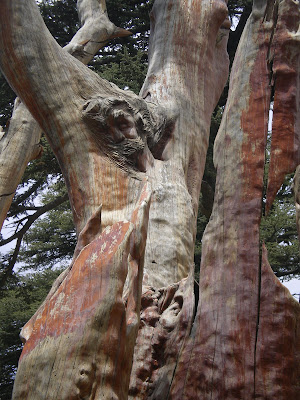 Down the other side of the hill, the forest disappears abruptly and there is an incredible panorama of snow-covered mountains and rolling rocky hills.
Down the other side of the hill, the forest disappears abruptly and there is an incredible panorama of snow-covered mountains and rolling rocky hills. 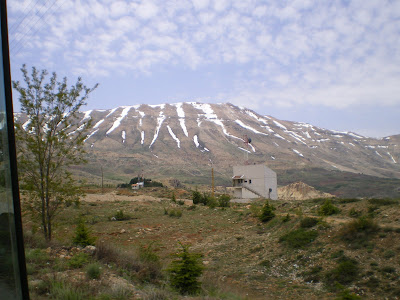 CL hiked off to take pictures of the snow. I sat on a rock and looked at the hills, breathing in the smells of the flowers and listening to the grumbling of the insects.
CL hiked off to take pictures of the snow. I sat on a rock and looked at the hills, breathing in the smells of the flowers and listening to the grumbling of the insects.
We hiked back to Bcharre with a little help from a guy who let us ride in the back of his pickup truck for about one and a half kilometres. We enjoyed a burger lunch at the local cafe and then, provisioned with appetising cans of luncheon meat and hummus, we set off for the valley floor.
The path to the Kadisha Valley floor from Bcharre town is supposed to run down the back of the church. We followed this path and, after climbing down a very steep path that wound between houses built into the cliff face, we came to a dead end. A lady leaned out of her window and shouted directions. We could walk all the way back up the incline (ugh) or we could cut through her neighbour's orchard in order to get to the path. Her neighbour, she said, "probably wouldn't shoot us". Awesome.
We cut through the orchard, pausing now and again to enjoy the views. The orchard ended at a small stream that ran down the side of the mountain. 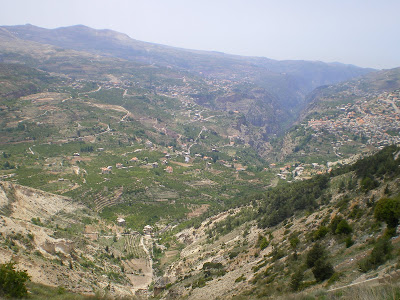 There were two paths, one across it and one up the rocks and around the top. A small man carrying a large box motioned to us that he was going down to the valley and we should cut across the stream. Now, when you are in a remote part of a country apparently teetering on the brink of civil war and you find yourself at a junction, looking for a way down a mountain, I challenge you to find a better source of directions than a small man carrying a large box. Who doesn't speak English. Or, from later inspection, any other recognisable language. We followed Small Large Box Man down the path and then, being more accustomed to the descent than us, he disappeared round a corner. As I took the bend in my stride, I came to a halt. The path ahead of us, the one and only path down the mountainside, was approximately one and a half feet wide. Very narrow indeed. When leading strangers down a mountainside along a narrow path, there are many things that would occur to the average person to do. Offer them water. Make polite conversation. Show worn photos of toothless wife and mugging grandkids. However, Small Large Box Man, in a fit of what can only be described as Fear Factor genius, had dumped his large box squarely onto the path. Hovering above it and to either side were hundreds of bees. The box had contained bees. Now there were bees everywhere and I had to walk through them. SLBM motioned for me to walk by as if it were the most natural thing in the world.
There were two paths, one across it and one up the rocks and around the top. A small man carrying a large box motioned to us that he was going down to the valley and we should cut across the stream. Now, when you are in a remote part of a country apparently teetering on the brink of civil war and you find yourself at a junction, looking for a way down a mountain, I challenge you to find a better source of directions than a small man carrying a large box. Who doesn't speak English. Or, from later inspection, any other recognisable language. We followed Small Large Box Man down the path and then, being more accustomed to the descent than us, he disappeared round a corner. As I took the bend in my stride, I came to a halt. The path ahead of us, the one and only path down the mountainside, was approximately one and a half feet wide. Very narrow indeed. When leading strangers down a mountainside along a narrow path, there are many things that would occur to the average person to do. Offer them water. Make polite conversation. Show worn photos of toothless wife and mugging grandkids. However, Small Large Box Man, in a fit of what can only be described as Fear Factor genius, had dumped his large box squarely onto the path. Hovering above it and to either side were hundreds of bees. The box had contained bees. Now there were bees everywhere and I had to walk through them. SLBM motioned for me to walk by as if it were the most natural thing in the world. 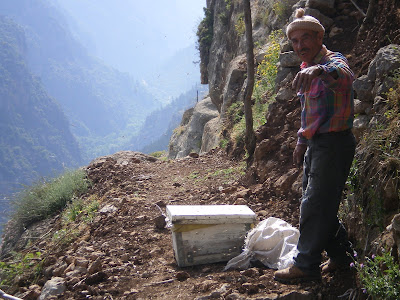 CL, Kris and I braved the bee gauntlet and continued our walk down the mountainside none the worse for wear.
CL, Kris and I braved the bee gauntlet and continued our walk down the mountainside none the worse for wear.
The Kadisha Valley is an exquisitely beautiful place. Not really a traditional valley but more of a gorge, the valley is formed by a deep, verdant chasm between two mountains. The valley floor and mountainsides are teeming with vegetation. Along the valley floor there is a dirt track negotiable by 4x4, leading between obscure houses and an incredibly pointless restaurant. The attractions of the Kadisha Valley are the scenery, the isolation and the monasteries. Several monasteries are built into the rock walls of the valley. Our destination was Deir Qannoubine, a monastery approximately 7km through the valley from the bottom of the Bcharre path. Deir Qannoubine is very special for many reasons, but to me the exquisiteness of its name is unrivalled by its other features. Qannoubine means Monastery. It is literally named Monastery Monastery, or, to give it the full nomenclature, Our Lady of the Monastery Monastery. It is said to be a functioning convent, which makes its double naming as a monastery even funnier.
Several hours and pints of sweat later, we reached Deir Qannoubine. About two-thirds up the rock wall of the valley, the monastery looks out over the valley to stunning effect, taking in the forests, houses, crags and waterfalls. The monastery was abandoned. A candle burning in the chapel meant that someone had been there recently, but we could find no person in residence. Kris and CL put up a tent to sleep in. I opted to sleep on the observation deck under the stars, a choice that I would not regret. I briefly flirted with the idea of sleeping in the chapel, but the chapel was colder than the deck and also had a creepy Evil Dead vibe that I didn't fancy braving.
We got a fire started and broke open our cans of "food". Tinned hummus and luncheon meat may have sounded good when we were in town, but the reality was horrific. The luncheon meat was particularly bad, but the hummus was a revelation of despair. It glooped out of the can in dry chunks and tasted like mashed potato soaked in vinegar. Beautiful. 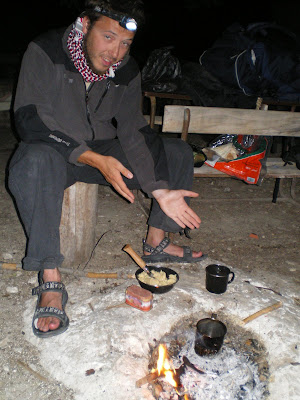 We sat around the fire, drank tea, choked down our "food" and bedded down for the night.
We sat around the fire, drank tea, choked down our "food" and bedded down for the night.
Lying on the observation deck, looking at the stars, the wind ruffling my hair, the heat of the day not yet gone, it was again impossible to imagine that somewhere on the other side of this great beauty and silence people were firing guns at each other. It's easy to think of conflicts as remote when you are in a different country or continent, but when you are in the same country, maybe three or four hours drive from the heart of the action, and all you can hear is the whistle of the wind and the creaking of the crickets, it really drives home the fact that violence is not as all-encompassing as the media would have us believe. People shooting in Beirut did not equal hordes of armed crazies running amok on every patch of land in the country. The moon was gibbous and hung bright and close. The stars were above my head, my feet touching the edge of the deck beneath which was a sheer drop to the valley floor. Not a shout, an explosion, a single shot could be heard. The loudest thing out here was my breathing and the Polish muttering of CL and Kris in their tent fifty yards away.
I drifted off to sleep. The strange silence that only religious buildings can produce enveloped me. Somewhere at the back of my mind, I expected blood-hungry undead nuns to burst from the cellars and devour us for trespassing. They never did.
Saturday 24 May 2008
Day 15: Tripoli/Batroun/Beddui Refugee Camp - The Intifada loves ping pong
CL and I got up fairly early. Today was to be the day we went to Bcharre, the mountain village from which we would hike through the Kadisha Valley, spend the night and then continue on the Baalbek. We were accompanied by Kris, a Polish guy we had met at the Pension Haddad. What we had not counted on was that the area of Lebanon we were in is Christian. Today was Sunday. There were no buses to Bcharre from Tripoli. Bukra, we were told over and over again. Tomorrow.
We heard that there might be a bus from Batroun to Bcharre, so we hopped a minibus to Batroun and were again confounded by the lack of transport. One taxi driver wanted LL100,000 to drive us to Bcharre. 50 euros. Insanity. Captain Libya went off in search of oranges. Kris and I stayed with the rucksacks and made conversation with a flamboyantly camp hairdresser named Jacques. Jacques was Lebanese and lisped manfully from beneath a meticulously groomed beard. He told us about the nightclubs in Batroun and Beirut. His vote went to a club called Acid, a notorious venue where the $20 entry price also includes free drinks all night. It also regularly gets busted for excessive quantities of gayness. It was Jacques who, while tittering gaily at the thought of it, told CL and me that the beach we had skinny-dipped at was a local gay hotspot. When I said that that explained the watchful guys on the shore, Jacques erupted into peels of laughter, squeezed my arm and called me honey. He gave me his number and told me to come see him at his salon for a haircut. I asked him where his salon was. In Casablanca, Morocco. It's called Jacques. Genius.
Upon CL's return with a sack of oranges, we hopped the shuttle back to Tripoli and tried to figure out what to do with the rest of the day. We all agreed that we wanted to see a Palestinian refugee camp. There were two in the immediate vicinity, Nahr-el-Bared, which had been destroyed by Hariri's forces about a year ago, and Beddui (pronounced bed-daow-wee), which was just on the other side of town. I called up Zach, a Palestinian guy we had met the night before, to ask him if he wanted to come with us. Zach said that if we wanted to see a camp, we should go to Beddui. I asked him if he wanted to come. He said absolutely not and hung up, but not before wishing us luck. For the record, Zach was one of the few Palestinians who ran a business in Tripoli outside of the camp and lived outside the camp as well. His business was selling car stereo equipment and mods.
Kris, CL and I took a taxi to the entrance to the Beddui camp. The entrance was sandbagged. A Palestinian flag fluttered in the breeze. A group of soldiers fish-eyed us from the pillbox. I smiled my best shit-eating grin and waved. The soldiers smiled back at us and waved us through. We were in.
The difference could be felt immediately upon entering the boundary of the camp. In Tripoli proper, Hariri is popular and posters of the Future party and Hariris pere et fils adorn every building and window. In Beddui, pictures on walls and windows are of Arafat, Nasrullah, Yassin and a young man who was identified to us later as Mohammed Khalili. Hamas and Hezbollah banners fly side by side with Palestinian flags. Arafat beams down from every wall from beneath his keffiyeh.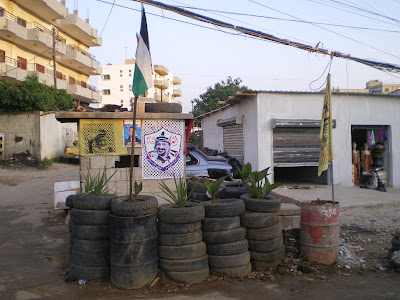 Saddam Hussein is another popular face, cropping up in shop windows and collages glued to walls.
Saddam Hussein is another popular face, cropping up in shop windows and collages glued to walls.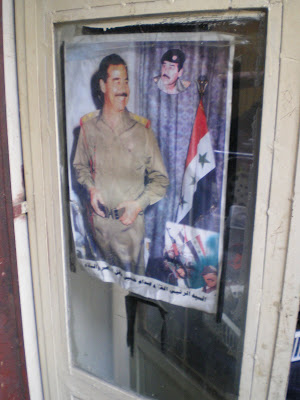
As we walked deeper into the camp, I spotted a white building adorned with flags, pictures of Palestine and pictures of martyrs. By the way, when I refer to pictures of Palestine, all pictures of Palestine that are displayed are of the whole country,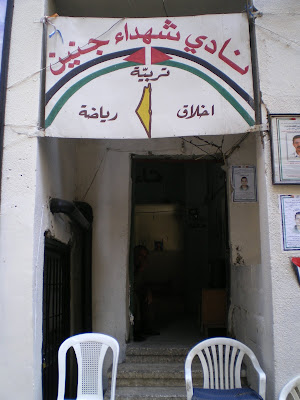 including the Israeli territory. The Palestinian idea of Palestine is not the West Bank and Gaza but of the whole kit-n-kaboodle, as we would find out later from the horse's mouth, as it were. OIutside the white building was a fat guy with ginger hair. He had a huge grin. In one of his hands he was twirling a walkie-talkie. Next to him was sitting a younger, darker-skinned guy. The ginger guy, I would find out, is named Zakariyah. The younger guy, who would become our impromptu interpreter during our visit, is named Hussein. I asked if we could take pictures of the edifice. They agreed. CL and I took pictures. I asked what the writing superimposed over the image of Palestine and the flag meant. Hussein explained that this was the clubhouse of Fatah-al-Intifada, an organisation whose nature he would never elaborate on beyond it's name. I asked if we could go inside. Zakariyah nodded, beamed his infectious grin at me and shook my hand. We were in.
including the Israeli territory. The Palestinian idea of Palestine is not the West Bank and Gaza but of the whole kit-n-kaboodle, as we would find out later from the horse's mouth, as it were. OIutside the white building was a fat guy with ginger hair. He had a huge grin. In one of his hands he was twirling a walkie-talkie. Next to him was sitting a younger, darker-skinned guy. The ginger guy, I would find out, is named Zakariyah. The younger guy, who would become our impromptu interpreter during our visit, is named Hussein. I asked if we could take pictures of the edifice. They agreed. CL and I took pictures. I asked what the writing superimposed over the image of Palestine and the flag meant. Hussein explained that this was the clubhouse of Fatah-al-Intifada, an organisation whose nature he would never elaborate on beyond it's name. I asked if we could go inside. Zakariyah nodded, beamed his infectious grin at me and shook my hand. We were in.
Inside the clubhouse were banners featuring Saddam Hussein, Arafat, Yassin, Nasrullah and a brace of martyrs. What caught my attention was a massive ping pong table in the middle of the room. Surrounded by so many pictures of angry, preaching men and backed by a massive mural of the Palestinian flag and map, the ping pong table seemed very incongruous.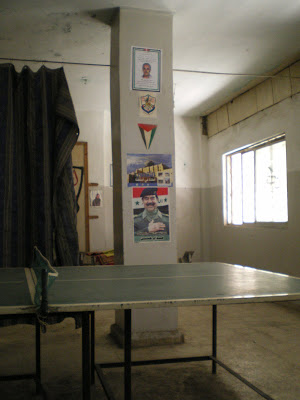 I asked Hussein if we could play. He wrinkled his brow at me. I made the semi-spanking back-and-forth motion of ping-ponging. Hussein grinned and said something to Zakariyah. Zakariyah spoke into the walkie talkie and then replied. Hussein explained that the paddles were in the office.
I asked Hussein if we could play. He wrinkled his brow at me. I made the semi-spanking back-and-forth motion of ping-ponging. Hussein grinned and said something to Zakariyah. Zakariyah spoke into the walkie talkie and then replied. Hussein explained that the paddles were in the office.
'Who has the keys?" I asked.
"The boss," he replied.
"Can we go see him?"
Hussein called something to Zakariyah and Zakariyah spoke into the walkie talkie again. Captain Libya and I exchanged a Look. This was going to be good. Zakariyah waved us out of the cool dark clubhouse and back into the brilliant sunlight. He whistled and a man dressed in black carrying an AK47 came out of the alley behind the clubhouse. Zakariyah motioned for him to take over the watch. The gunman sat down. I smiled at him and waved. He waved back and grinned. I made the ping-pong motion. He gave me a thumbs-up. The Intifada loves ping pong. Who knew?
Zakariya and Hussein walked us through the labyrinth of houses and alleys that compose the centre of the Beddui camp. We eventually got to a nondescript house with an immaculate interior. We were met at the top of the stairs by a quiet, bearded man in house pants and slippers. He had a very firm handshake. I introduced myself and asked his name. After a pause, he told me his name was Abou Yasser. I was shaking hands with the head of Fatah al-Intifada in northern Lebanon.
Abou Yasser spoke serviceable English and, whenever he didn't pick up on a point, Hussein happily translated. CL, Kris and myself were invited to sit down in his living room and we were given cold fruit juice which we gulped down greedily. I asked Abou Yasser some questions about the camp to begin with.
The Beddui camp has been in existence since 1948 and was one of the first refugee camps to be built in Lebanon. Abou Yasser himself was born in the camp and, despite his high position int he organisation, has never been outside of Lebanon. This is a very common problem for the Palestinians designated as refugees. They are given Lebanese papers, but only for identification purposes. Their papers state that they are refugees. They are not allowed to vote, they have a hard time getting jobs outside of their camps and, while officially permitted, international travel is practically impossible because nobody will issue a visa to a Palestinian refugee. The refugees who live in the camp are born there, live there, get married there, have children there and die there. They blame this situation on the Lebanese authorities in particular and the Arab League in general. Abou Yasser pointed out more than once that if the Arab countries had done a better job of absorbing and assimilating the Palestinians, the feelings of separatism and the urge to return might not be as strong as they are under the current circumstances.
The Beddui camp held about 30,000 Palestinians until late last year. After the assault on the Nahr-el-Bared camp, the survivors of Nahr-el-Bared were brought to Beddui and assimilated there. Abou Yasser said the best estimate put the population of Beddui camp at about 45,000 people. They are not given access to Lebanese public services. Lebanese police do not patrol the camp or respond to calls from it. Ditto the fire department. The Beddui camp is in essence an entirely self-contained society, providing its own police and utility infrastructure. Papers are published inside the camp. Books are printed. Music is recorded. It functions completely outside of Lebanese society and Palestinians are apparently viewed with distrust or outright hostility by the Lebanese population at large. Under conditions such as those we saw at the camp, it is no wonder that the Palestinians feel only an allegiance to their idea of Palestine, a Palestine they have never seen and, in most cases, a Palestine their parents and even grandparents have never seen. How could they feel any different when they are given no opportunity to assimilate into their host country?
The conversation turned to the sensitive question of Israel and the possibility of a resolution to the current problem. Abou Yasser told me that whatever the official statements, the out-and-out goal of the Palestinian movement is to achieve a single country. He said that a two-state solution would only be temporary. The intention, he said, is to have one country, called Palestine, run democratically by the concensus of all citizens, Jewish, Muslim, Christian or whatever. I asked him if he thought it would be possible for Palestinians to live with Israelis side by side after all the animosity that has flown between the two sides. He said that in his opinion, and in the stated aims of his organisation, the single state solution would be achieved in a minimum of another sixty years. I asked him how it felt to work towards something that he would never see and never experience for himself. He squeezed Hussein's shoulder and told me that the idea of Palestine was taught to every child throughout their lives. Wherever they live, whatever they do with their lives, the idea of Palestine as their home and birthright is always with them. I asked him if money from the camp was sent to other organisations such as Hamas or Hezbollah. There was an awkward pause. Abou Yasser said, quite delicately, that of course money is sent to certain, ahem, organisations, because they have the same aims and are brothers of the Palestinians. I asked him if he forsaw a problem between the Palestinians and Hezbollah in the future, since Hezbollah are Shia and Palestinians are Sunnis.
"We will solve that problem when we have a country," he replied with a smile. "For now Hezbollah are our brothers."
Abou Yasser was at pains to repeat time and time again that religion was not an issue in the struggle. Jews, Christians and Muslims would all be safe and welcome in the state of Palestine, he told me, but it had to be a state named Palestine and run by a democratic government. He also told me that the other Arab nations use the Palestinians as an excuse for their own political maneuvres, something that evidently bothered him very much. He also repeated that the Palestinians do not only have a problem with the Israelis, but also with the Arabs that oppress the Palestinian people, restrict their rights and use their plight as PR fodder for other aims.
I asked Abou Yasser about the pictures I had seen of the young man, Mohammed Khalili. He told me that Mohammed Khalili was his son. I asked what happened. He told me that Mohammed Khalili had been killed in Beddui camp, trying to break up a fight. He had been stabbed to death. Abou Yasser had manufactured posters of his son to be put up all over the camp as a reminder. He posed for a picture next to his son's poster, smiling up at him and then another, looking directly into the camera.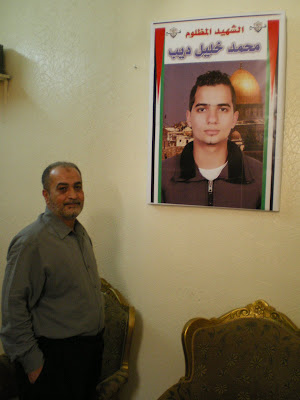
All in all, our conversation must have lasted just under an hour. At times it was surreal, sitting there next to a man who runs a leg of an organisation referred to as terrorist by so many. All I could think of was that the same guy that prints posters of his son holding a machine gun also has a key to the office where the ping pong paddles are kept. And he gave us really good juice. Very strange.
After taking our leave of Abou Yasser, Hussein accompanied us through the camp as our translator. We stopped off at a gift shop where Hezbollah and Hamas keychains and necklaces are sold alongside ones with the image of Che Guevara.
"Che Guevara," Hussein said, "is a hero to Palestinians."
"Why?"
"He is the ultimate fighter for the oppressed."
I didn't mention the numerous executions of the oppressed by Che Guevara in stadiums around Cuba during the revolution. It didn't seem like the right time or place. I bought a postcard from the hunched-over old lady behind the counter to send to my wife.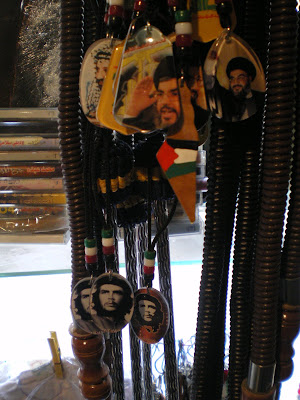
On our way out of the camp, Zakariya invited us to his home. We walked up the steps to his flat, which occupies the top floor of a four-storey house. The other apartments in the building are occupied by his brothers and their families. Zakariya has seven brothers and eight sister. Sixteen siblings in all. He has five children himself, all of who have his freckles and infectious smile. Kris and CL smoked an argileh and chatted in Polish as I played with the kids and spoke to Zakariyah through Hussein. Zakariyah had shwarmas brought for us from his brother's shwarma stall and as we ate, they asked me questions about England and my wife. A friend of Zakariyah's arrived and, after a few minutes, asked me what I thought of the Danish cartoon fiasco, something that cropped up very often during my trip.
I replied that in Britain offending someone is not against the law. In a democracy, I said, making someone unhappy should not be punishable. That was what democracy was about. Being able to offend people. The answer seemed to satisfy them and we continued our conversation.
After several cups of tea and a few false starts at saying goodbye, CL, Kris and I left the Beddui camp. Zakariya, Hussein and the guy with the AK47 all waved cheerfully to us as we left. Hussein asked me when I would be back and gave me his email address. I also was given Abou Yasser's email address. He has a Hotmail account. I found that very funny, but not in front of him.
We walked back to the Pension Haddad, talking about our impressions of the camp. We had been told that Lebanon was dangerous and had not seen or felt any threat. We had been told that the camps were dangerous and the Palestinians were crazy. They had given us juice and tea and spoken calmly if passionately about democracy and statehood. It was hard, walking home that night, to believe the things I had been told were anything more than hearsay. Surely if people had seen these places and met these people they would have, if not a different, then at least a more sympathetic opinion. The hidden sharp edges in Abou Yasser's talk of a Palestinian state for all peoples and a democracy that protected Jews and Muslims equally couldn't be ignored, nor did I find it easy to believe that after so many years of acrimony the Jews and Muslims would just lump together under one flag and all sing Kumbaya while holding hands. However, if the purpose of going to these places is to find out what the people there really feel and think as opposed to what the media says they feel and think, then surely part of the deal is that I have to be willing to take a certain amount of what they say at face value.
We heard that there might be a bus from Batroun to Bcharre, so we hopped a minibus to Batroun and were again confounded by the lack of transport. One taxi driver wanted LL100,000 to drive us to Bcharre. 50 euros. Insanity. Captain Libya went off in search of oranges. Kris and I stayed with the rucksacks and made conversation with a flamboyantly camp hairdresser named Jacques. Jacques was Lebanese and lisped manfully from beneath a meticulously groomed beard. He told us about the nightclubs in Batroun and Beirut. His vote went to a club called Acid, a notorious venue where the $20 entry price also includes free drinks all night. It also regularly gets busted for excessive quantities of gayness. It was Jacques who, while tittering gaily at the thought of it, told CL and me that the beach we had skinny-dipped at was a local gay hotspot. When I said that that explained the watchful guys on the shore, Jacques erupted into peels of laughter, squeezed my arm and called me honey. He gave me his number and told me to come see him at his salon for a haircut. I asked him where his salon was. In Casablanca, Morocco. It's called Jacques. Genius.
Upon CL's return with a sack of oranges, we hopped the shuttle back to Tripoli and tried to figure out what to do with the rest of the day. We all agreed that we wanted to see a Palestinian refugee camp. There were two in the immediate vicinity, Nahr-el-Bared, which had been destroyed by Hariri's forces about a year ago, and Beddui (pronounced bed-daow-wee), which was just on the other side of town. I called up Zach, a Palestinian guy we had met the night before, to ask him if he wanted to come with us. Zach said that if we wanted to see a camp, we should go to Beddui. I asked him if he wanted to come. He said absolutely not and hung up, but not before wishing us luck. For the record, Zach was one of the few Palestinians who ran a business in Tripoli outside of the camp and lived outside the camp as well. His business was selling car stereo equipment and mods.
Kris, CL and I took a taxi to the entrance to the Beddui camp. The entrance was sandbagged. A Palestinian flag fluttered in the breeze. A group of soldiers fish-eyed us from the pillbox. I smiled my best shit-eating grin and waved. The soldiers smiled back at us and waved us through. We were in.
The difference could be felt immediately upon entering the boundary of the camp. In Tripoli proper, Hariri is popular and posters of the Future party and Hariris pere et fils adorn every building and window. In Beddui, pictures on walls and windows are of Arafat, Nasrullah, Yassin and a young man who was identified to us later as Mohammed Khalili. Hamas and Hezbollah banners fly side by side with Palestinian flags. Arafat beams down from every wall from beneath his keffiyeh.
As we walked deeper into the camp, I spotted a white building adorned with flags, pictures of Palestine and pictures of martyrs. By the way, when I refer to pictures of Palestine, all pictures of Palestine that are displayed are of the whole country,
Inside the clubhouse were banners featuring Saddam Hussein, Arafat, Yassin, Nasrullah and a brace of martyrs. What caught my attention was a massive ping pong table in the middle of the room. Surrounded by so many pictures of angry, preaching men and backed by a massive mural of the Palestinian flag and map, the ping pong table seemed very incongruous.
'Who has the keys?" I asked.
"The boss," he replied.
"Can we go see him?"
Hussein called something to Zakariyah and Zakariyah spoke into the walkie talkie again. Captain Libya and I exchanged a Look. This was going to be good. Zakariyah waved us out of the cool dark clubhouse and back into the brilliant sunlight. He whistled and a man dressed in black carrying an AK47 came out of the alley behind the clubhouse. Zakariyah motioned for him to take over the watch. The gunman sat down. I smiled at him and waved. He waved back and grinned. I made the ping-pong motion. He gave me a thumbs-up. The Intifada loves ping pong. Who knew?
Zakariya and Hussein walked us through the labyrinth of houses and alleys that compose the centre of the Beddui camp. We eventually got to a nondescript house with an immaculate interior. We were met at the top of the stairs by a quiet, bearded man in house pants and slippers. He had a very firm handshake. I introduced myself and asked his name. After a pause, he told me his name was Abou Yasser. I was shaking hands with the head of Fatah al-Intifada in northern Lebanon.
Abou Yasser spoke serviceable English and, whenever he didn't pick up on a point, Hussein happily translated. CL, Kris and myself were invited to sit down in his living room and we were given cold fruit juice which we gulped down greedily. I asked Abou Yasser some questions about the camp to begin with.
The Beddui camp has been in existence since 1948 and was one of the first refugee camps to be built in Lebanon. Abou Yasser himself was born in the camp and, despite his high position int he organisation, has never been outside of Lebanon. This is a very common problem for the Palestinians designated as refugees. They are given Lebanese papers, but only for identification purposes. Their papers state that they are refugees. They are not allowed to vote, they have a hard time getting jobs outside of their camps and, while officially permitted, international travel is practically impossible because nobody will issue a visa to a Palestinian refugee. The refugees who live in the camp are born there, live there, get married there, have children there and die there. They blame this situation on the Lebanese authorities in particular and the Arab League in general. Abou Yasser pointed out more than once that if the Arab countries had done a better job of absorbing and assimilating the Palestinians, the feelings of separatism and the urge to return might not be as strong as they are under the current circumstances.
The Beddui camp held about 30,000 Palestinians until late last year. After the assault on the Nahr-el-Bared camp, the survivors of Nahr-el-Bared were brought to Beddui and assimilated there. Abou Yasser said the best estimate put the population of Beddui camp at about 45,000 people. They are not given access to Lebanese public services. Lebanese police do not patrol the camp or respond to calls from it. Ditto the fire department. The Beddui camp is in essence an entirely self-contained society, providing its own police and utility infrastructure. Papers are published inside the camp. Books are printed. Music is recorded. It functions completely outside of Lebanese society and Palestinians are apparently viewed with distrust or outright hostility by the Lebanese population at large. Under conditions such as those we saw at the camp, it is no wonder that the Palestinians feel only an allegiance to their idea of Palestine, a Palestine they have never seen and, in most cases, a Palestine their parents and even grandparents have never seen. How could they feel any different when they are given no opportunity to assimilate into their host country?
The conversation turned to the sensitive question of Israel and the possibility of a resolution to the current problem. Abou Yasser told me that whatever the official statements, the out-and-out goal of the Palestinian movement is to achieve a single country. He said that a two-state solution would only be temporary. The intention, he said, is to have one country, called Palestine, run democratically by the concensus of all citizens, Jewish, Muslim, Christian or whatever. I asked him if he thought it would be possible for Palestinians to live with Israelis side by side after all the animosity that has flown between the two sides. He said that in his opinion, and in the stated aims of his organisation, the single state solution would be achieved in a minimum of another sixty years. I asked him how it felt to work towards something that he would never see and never experience for himself. He squeezed Hussein's shoulder and told me that the idea of Palestine was taught to every child throughout their lives. Wherever they live, whatever they do with their lives, the idea of Palestine as their home and birthright is always with them. I asked him if money from the camp was sent to other organisations such as Hamas or Hezbollah. There was an awkward pause. Abou Yasser said, quite delicately, that of course money is sent to certain, ahem, organisations, because they have the same aims and are brothers of the Palestinians. I asked him if he forsaw a problem between the Palestinians and Hezbollah in the future, since Hezbollah are Shia and Palestinians are Sunnis.
"We will solve that problem when we have a country," he replied with a smile. "For now Hezbollah are our brothers."
Abou Yasser was at pains to repeat time and time again that religion was not an issue in the struggle. Jews, Christians and Muslims would all be safe and welcome in the state of Palestine, he told me, but it had to be a state named Palestine and run by a democratic government. He also told me that the other Arab nations use the Palestinians as an excuse for their own political maneuvres, something that evidently bothered him very much. He also repeated that the Palestinians do not only have a problem with the Israelis, but also with the Arabs that oppress the Palestinian people, restrict their rights and use their plight as PR fodder for other aims.
I asked Abou Yasser about the pictures I had seen of the young man, Mohammed Khalili. He told me that Mohammed Khalili was his son. I asked what happened. He told me that Mohammed Khalili had been killed in Beddui camp, trying to break up a fight. He had been stabbed to death. Abou Yasser had manufactured posters of his son to be put up all over the camp as a reminder. He posed for a picture next to his son's poster, smiling up at him and then another, looking directly into the camera.
All in all, our conversation must have lasted just under an hour. At times it was surreal, sitting there next to a man who runs a leg of an organisation referred to as terrorist by so many. All I could think of was that the same guy that prints posters of his son holding a machine gun also has a key to the office where the ping pong paddles are kept. And he gave us really good juice. Very strange.
After taking our leave of Abou Yasser, Hussein accompanied us through the camp as our translator. We stopped off at a gift shop where Hezbollah and Hamas keychains and necklaces are sold alongside ones with the image of Che Guevara.
"Che Guevara," Hussein said, "is a hero to Palestinians."
"Why?"
"He is the ultimate fighter for the oppressed."
I didn't mention the numerous executions of the oppressed by Che Guevara in stadiums around Cuba during the revolution. It didn't seem like the right time or place. I bought a postcard from the hunched-over old lady behind the counter to send to my wife.
On our way out of the camp, Zakariya invited us to his home. We walked up the steps to his flat, which occupies the top floor of a four-storey house. The other apartments in the building are occupied by his brothers and their families. Zakariya has seven brothers and eight sister. Sixteen siblings in all. He has five children himself, all of who have his freckles and infectious smile. Kris and CL smoked an argileh and chatted in Polish as I played with the kids and spoke to Zakariyah through Hussein. Zakariyah had shwarmas brought for us from his brother's shwarma stall and as we ate, they asked me questions about England and my wife. A friend of Zakariyah's arrived and, after a few minutes, asked me what I thought of the Danish cartoon fiasco, something that cropped up very often during my trip.
I replied that in Britain offending someone is not against the law. In a democracy, I said, making someone unhappy should not be punishable. That was what democracy was about. Being able to offend people. The answer seemed to satisfy them and we continued our conversation.
After several cups of tea and a few false starts at saying goodbye, CL, Kris and I left the Beddui camp. Zakariya, Hussein and the guy with the AK47 all waved cheerfully to us as we left. Hussein asked me when I would be back and gave me his email address. I also was given Abou Yasser's email address. He has a Hotmail account. I found that very funny, but not in front of him.
We walked back to the Pension Haddad, talking about our impressions of the camp. We had been told that Lebanon was dangerous and had not seen or felt any threat. We had been told that the camps were dangerous and the Palestinians were crazy. They had given us juice and tea and spoken calmly if passionately about democracy and statehood. It was hard, walking home that night, to believe the things I had been told were anything more than hearsay. Surely if people had seen these places and met these people they would have, if not a different, then at least a more sympathetic opinion. The hidden sharp edges in Abou Yasser's talk of a Palestinian state for all peoples and a democracy that protected Jews and Muslims equally couldn't be ignored, nor did I find it easy to believe that after so many years of acrimony the Jews and Muslims would just lump together under one flag and all sing Kumbaya while holding hands. However, if the purpose of going to these places is to find out what the people there really feel and think as opposed to what the media says they feel and think, then surely part of the deal is that I have to be willing to take a certain amount of what they say at face value.
On the one hand, I doubt if Abou Yasser and Hussein would prance in the moonlight together with the Israelis if they had one country called Palestine for both peoples, but on the other I couldn't help but notice that everyone who was a member of Fatah al-Intifada enjoyed luxuries that were not available to the rest of the camp at large. They had nice apartments with beautifully tiled floors, functioning bathrooms, large bedrooms. How much of their passion for the cause was because of their inner fire and how much of it was because of the benefits the cause affords them? They were never anything less than courteous and hospitable to me, even when I asked them questions about their organisation and its aims. Their use of language was always very delicate though, never referring to violence, terror, attacks or war. They used words like "problem", "resolution", "democracy", "solution". For people with at best an intermediate grasp of the English language, their vocabulary was very well attuned to the intricacy of political discourse.
Only Hussein, a 21 year-old who had just broken up with his girlfriend, betrayed any obvious sense of anger. His eyes flashed when he talked about Israel and he referred to himself and the Palestinian people as victims. Hussein had lived in the Nahr-el-Bared camp until it was bombed by Hariri last year. When I asked him what the siege had been like, his face hardened and he mentioned briefly that he and what was left of his family had been brought to Beddui afterwards. I didn't want to press him and he didn't give me the impression that anything would be forthcoming if I did.
It's hard to produce any sort of Doogie Howser-esque summing up of the Palestinian ideology, their living conditions, their existence. What I would say is that everyone I met who was part of their cause had never seen or set foot in the land they were fighting for. They themselves had been told about their history by parents or grandparents, people who may or may not have given honest representations of what really happened. What I did see is that the circumstances in which they live are not conducive to a resolution or an assimilation into another country. They are treated at arms length and, most of the time, with great disdain. To the West, the Palestinian cause is trotted out as a grand struggle of the oppressed, but the Arab nations that tout their piety so aggressively in the Western media are loathe to actually do anything for these people on their own soil. Faced with that kind of deadpan hypocrisy on one side and the perceived indifference or aggression of the West on the other, it is no wonder that so many of them, as Hussein put it, consider themselves "the victims of both sides".
Hussein had just broken up with a girlfriend. He told me about their relationship. In his society, they had to meet in secret. Only when they were prepared to marry could they reveal their relationship to their parents. Sex before marriage was not only forbidden for women but also frowned upon for men. Hussein threaded his arm through mine as we walked in the Arabic gesture of familiarity that takes so much getting used to for a Westerner. He was wide-eyed when I told him that in the West it was considered naive to marry before having sex and that a person's experience with the opposite sex was largely considered a good thing when settling down. Even with the internet and the countless films, songs and books made by our Western culture, there are huge swathes of people who have no idea of how we actually go about our days. It is easy for them to be told we are immoral because our side is never represented except by Britney Spears or Warner Brothers, neither of whom do a very good job of showing us as anything more than vapid sex-obsessed monomaniacs. Hussein and I parted ways with a kiss on both cheeks and a firm heartfelt handshake. Zakariya, fat and jolly as always, gave me his enormous grin and a huge hug. He pressed his mobile phone number into my hand and told me that if we ran into any trouble with the Hez to get them to call him and he would smooth it over. Abou Yasser had told me it was a pleasure meeting me and asked me to come with a professional translator next time so that we could have a better, more in-depth discussion. Time and again when I was asked about the Danish cartoon thing, I told them my honest opinion which is that disrespect or ridicule should not be prevented by law in a democratic country and, despite their religious indignation, they all seemed to accept my answer as reasonable. Throughout our time at the camp, the most affecting contrast of all was the warmth of the welcome we received from the people while surrounded by grim and sometimes outright gruesome propaganda plastered on every available surface. When I say grim and gruesome, I don't mean that as a value judgement, I mean literally pictures of gunmen, blood-soaked weapons, cartoonish murals of children bleeding and fighting, all surrounding a people who were so open and friendly that it seemed inconceivable that any of them could have drawn any of the pictures that surrounded them.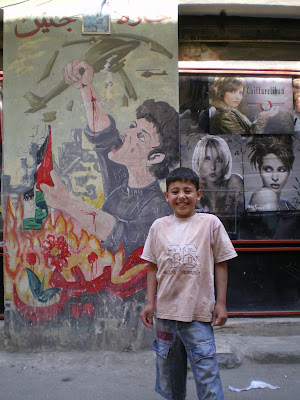 My favourite picture was of Zakariya's son, beaming into the camera with his father's smile, behind him to one side the images of glamourous women in the window of a shop and to the other side a mural of a young mujahed crushing a helicopter in his fist and bleeding.
My favourite picture was of Zakariya's son, beaming into the camera with his father's smile, behind him to one side the images of glamourous women in the window of a shop and to the other side a mural of a young mujahed crushing a helicopter in his fist and bleeding.
Captain Libya, Kris and I arrived back at the Pension Haddad exhausted from the long walk. We drank some tea, provided for free by the incredibly hunched grandmother, and played crackgammon until we all fell asleep.
Day 14: Tripoli/Byblos - "Dude, this is a gay beach!"
The mosquitoes in Tripoli are brutal. They whined in my ears all night and when I woke up my arms were itchy, swollen testaments to their thirst. Bartek and I rustled out of bed, got dressed and headed for Byblos, an ancient ruin dramatically poised on a headland overlooking the Mediterranean. The ruins there date back thousands of years and include an amphitheatre and several temples and houses layered on top of each other. The Phoenicians, the Romans and the Babylonians apparently all laid their mark on Byblos at one time or another.
We took a minibus from Tripoli centre to Byblos, but of course we forgot that the Arabic name for Byblos is Jbail, so when they called it, we sat there like lemons and missed our stop. It all worked out for the best though, because the two kilometre or so walk back along the highway allowed us a sneaky little detour. The beaches on either side of Byblos are owned predominantly by private resorts that cater to a very pampered clientele. Bartek, who, by the way, will heretofore be referred to as Captain Libya or CL, and I strolled up to the reception of one of these resorts and I informed them in my best adamant but nice tone that we intended to walk along the beach. This prompted much consternation among the drones behind the counter and climaxed with one of them telling us that under no circumstances could we do such a thing exactly three seconds before an older woman in a uniform said we could go ahead but remember that usually they charge for access.
We walked along a pristine sandy beach, soaking up the rays, feeling the ocean spray on our skin, wriggling our toes in the sand. About a kilometre and a half down the beach, we reached a fence. On one side of the fence was a beautifully kept beach with pasty gwai-los sunning themselves on lounge chairs. On the other side of the fence was a mess of stones, litter, plastic bags, clothes, detritus and general crap. This fence delineated the private resort beach from the public beach.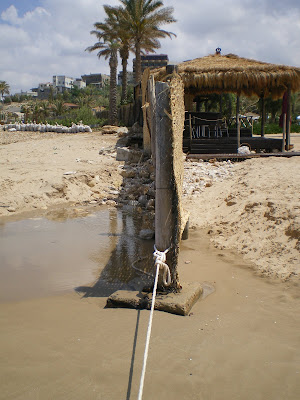 I decided that I wanted to go swimming. However, I had brought no trunks. As my wife can attest to, this has never stopped me before, and by God, Muslim country or not, I was going for a dip in my birthday suit.
I decided that I wanted to go swimming. However, I had brought no trunks. As my wife can attest to, this has never stopped me before, and by God, Muslim country or not, I was going for a dip in my birthday suit.
A finger of rock jutted out into the spray and on it stood several men of obviously Lebanese provenance but indeterminate purpose. They all seemed to just be hanging out, but in an uncomfortable way. CL and I noticed this but thought nothing of it. After all, other than on the filthy rocks of the public beach, there was nowhere to sit. Perhaps their shiftlessness was a result of insufficient seating.
I hung my trousers and shirt on the fence and tiptoed over the jagged rocks to the waterline. I looked around. Several moustachioed men looked on hungrily. CL waved at me from the fence.
"Are you really going in?"
By way of a response, I appropriated an abandoned plastic water bottle, stuck it into the sand, whipped off my keks and hung them from it triumphantly. I then ran, flesh ahoy, into the welcoming spray of the sea. I had underestimated both the quantity and sharpness of the rocks, which resulted in several cuts to my hands and feet and an incredibly close call involving my rear.
The water was awesome. I splashed around, happy as Larry, for about ten minutes or so. The men on the rock promontory had the facial expressions of fat children at a candy store window. It still hadn't sunk in though. I was having way too much fun. CL decided to join me. He exposed his skinny Polish corpse to the sun and ran, giggling like a schoolgirl, into the sea. We swam for a while longer and then decided to take pictures of me leaping through the spray, naked, with the luxury resort beach in the background. We took several photos. They will make their way onto this public record shortly, when I have access to a computer with USB action.
By the way, as an aside, I think I need to answer those of you who are asking me why there aren't more pics. The answer is simple. Either the computer I am using has no USB, the connection is too slow to upload or I stumbled across the internet without having the connecting cable for my camera. That is why some posts have pics and others don't. In time I will fix that. Please bear with me.
After taking several pictures of yours truly in various alluringly aquarian poses, CL and I repaired to the shore where I drip-dried agonisingly slowly under the scrutiny of the hungry-eyed men. Then we got dressed and continued on our way.
The beach came to a dead end at a sheer cliff face, round the side of which was a field of high grass. We walked through the high grass and climbed the path at the side of the cliff until we entered an abandoned Armenian graveyard. We knew it was Armenian because of the alphabet and the crosses.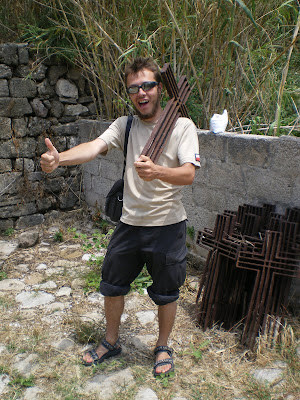 From the graveyard we entered an Armenian boarding school through the back way. Surprising a cheerful and chubby lunch lady who spoke excellent English, we found the way to the main road and got to Byblos.
From the graveyard we entered an Armenian boarding school through the back way. Surprising a cheerful and chubby lunch lady who spoke excellent English, we found the way to the main road and got to Byblos.
The ruins were beautiful. I mainly lazed in the sun admiring the vistas as CL tramped faithfully across every inch of ground taking pictures of everything. We met a couple who had lived in America for twenty years and just come back to Lebanon. We chatted on the steps of the amphitheatre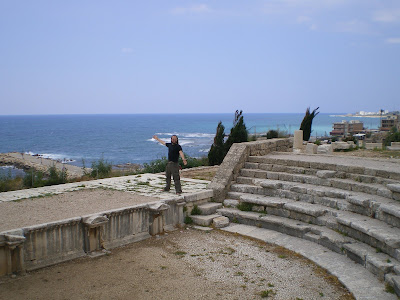 and before leaving they told us to have a good time and stay away from Beirut. Until they mentioned Beirut, CL and I had completely forgotten the current situation in the country. With the warm breeze coming in off the ocean, the quiet stateliness of the ruins, the beach, the distant cries of children running around in the boarding school playground, it was almost impossible to believe that somewhere in the country people were being killed.
and before leaving they told us to have a good time and stay away from Beirut. Until they mentioned Beirut, CL and I had completely forgotten the current situation in the country. With the warm breeze coming in off the ocean, the quiet stateliness of the ruins, the beach, the distant cries of children running around in the boarding school playground, it was almost impossible to believe that somewhere in the country people were being killed.
CL and I left the ruins at Byblos and walked to the highway. We tried hitchhiking back to Tripoli. The Lebanese, perhaps due to the security situation or maybe as a cultural result of years of war, do not stop for hitchhikers. We waited the best part of an hour for a 14km ride from Byblos to Batroun. I asked our driver, a young lady who had learned English in America, what she thought of the war. She said that it flares up every once in a while and all the locals do is just ignore it until it dies back down. She was coming from Beirut herself and was on her way to drink and dance at one of the many fabled nightspots in Batroun. Her response to the outbreak of hostilities in Beirut was extremely common.
In the service taxi on the way to Tripoli from Lattakia, the guy riding shotgun was a hacker namer Ahmad. Ahmad, when I asked about the situation, said that to him they were all just children playing war games and pointing the finger at each other. To him there was no right or wrong in the situation, just idiots wanting to swing their guns around for a bit before settling down again. Just as he said that, the radio news broadcast statements from Hezbollah and the Future party run by Sah al-Hariri. Hariri blamed the fighting on Hezbollah being agitated and funded by Iran and Syria, Hezbollah blamed the fighting on interference in the region by the US and Israel. Ahmad pointed at the radio.
"You see?" he said. "They are just little kids, fighting and blaming each other. It's all bullshit."
As we had our passports processed, I found out that one of Ahmad's bread-and-butter gigs was hacking Facebook poker, getting loads of chips and selling them to people who wanted to play. He told me that whenever there was trouble in Lebanon, he went from Syria back to his home in Tripoli and worked there because nobody would bother him for hacking when there was fighting. When the fighting settles down, he goes back to his flat in Syria and works from there.
"So the fighting is good for your business," I said.
Ahmad shrugged. "That's life," he replied. "They want to fight, I sell poker chips."
CL and I were dropped by our benefactor at the exit ramp for Batroun just in time to catch a connecting minibus back to Tripoli.
We took a minibus from Tripoli centre to Byblos, but of course we forgot that the Arabic name for Byblos is Jbail, so when they called it, we sat there like lemons and missed our stop. It all worked out for the best though, because the two kilometre or so walk back along the highway allowed us a sneaky little detour. The beaches on either side of Byblos are owned predominantly by private resorts that cater to a very pampered clientele. Bartek, who, by the way, will heretofore be referred to as Captain Libya or CL, and I strolled up to the reception of one of these resorts and I informed them in my best adamant but nice tone that we intended to walk along the beach. This prompted much consternation among the drones behind the counter and climaxed with one of them telling us that under no circumstances could we do such a thing exactly three seconds before an older woman in a uniform said we could go ahead but remember that usually they charge for access.
We walked along a pristine sandy beach, soaking up the rays, feeling the ocean spray on our skin, wriggling our toes in the sand. About a kilometre and a half down the beach, we reached a fence. On one side of the fence was a beautifully kept beach with pasty gwai-los sunning themselves on lounge chairs. On the other side of the fence was a mess of stones, litter, plastic bags, clothes, detritus and general crap. This fence delineated the private resort beach from the public beach.
A finger of rock jutted out into the spray and on it stood several men of obviously Lebanese provenance but indeterminate purpose. They all seemed to just be hanging out, but in an uncomfortable way. CL and I noticed this but thought nothing of it. After all, other than on the filthy rocks of the public beach, there was nowhere to sit. Perhaps their shiftlessness was a result of insufficient seating.
I hung my trousers and shirt on the fence and tiptoed over the jagged rocks to the waterline. I looked around. Several moustachioed men looked on hungrily. CL waved at me from the fence.
"Are you really going in?"
By way of a response, I appropriated an abandoned plastic water bottle, stuck it into the sand, whipped off my keks and hung them from it triumphantly. I then ran, flesh ahoy, into the welcoming spray of the sea. I had underestimated both the quantity and sharpness of the rocks, which resulted in several cuts to my hands and feet and an incredibly close call involving my rear.
The water was awesome. I splashed around, happy as Larry, for about ten minutes or so. The men on the rock promontory had the facial expressions of fat children at a candy store window. It still hadn't sunk in though. I was having way too much fun. CL decided to join me. He exposed his skinny Polish corpse to the sun and ran, giggling like a schoolgirl, into the sea. We swam for a while longer and then decided to take pictures of me leaping through the spray, naked, with the luxury resort beach in the background. We took several photos. They will make their way onto this public record shortly, when I have access to a computer with USB action.
By the way, as an aside, I think I need to answer those of you who are asking me why there aren't more pics. The answer is simple. Either the computer I am using has no USB, the connection is too slow to upload or I stumbled across the internet without having the connecting cable for my camera. That is why some posts have pics and others don't. In time I will fix that. Please bear with me.
After taking several pictures of yours truly in various alluringly aquarian poses, CL and I repaired to the shore where I drip-dried agonisingly slowly under the scrutiny of the hungry-eyed men. Then we got dressed and continued on our way.
The beach came to a dead end at a sheer cliff face, round the side of which was a field of high grass. We walked through the high grass and climbed the path at the side of the cliff until we entered an abandoned Armenian graveyard. We knew it was Armenian because of the alphabet and the crosses.
The ruins were beautiful. I mainly lazed in the sun admiring the vistas as CL tramped faithfully across every inch of ground taking pictures of everything. We met a couple who had lived in America for twenty years and just come back to Lebanon. We chatted on the steps of the amphitheatre
CL and I left the ruins at Byblos and walked to the highway. We tried hitchhiking back to Tripoli. The Lebanese, perhaps due to the security situation or maybe as a cultural result of years of war, do not stop for hitchhikers. We waited the best part of an hour for a 14km ride from Byblos to Batroun. I asked our driver, a young lady who had learned English in America, what she thought of the war. She said that it flares up every once in a while and all the locals do is just ignore it until it dies back down. She was coming from Beirut herself and was on her way to drink and dance at one of the many fabled nightspots in Batroun. Her response to the outbreak of hostilities in Beirut was extremely common.
In the service taxi on the way to Tripoli from Lattakia, the guy riding shotgun was a hacker namer Ahmad. Ahmad, when I asked about the situation, said that to him they were all just children playing war games and pointing the finger at each other. To him there was no right or wrong in the situation, just idiots wanting to swing their guns around for a bit before settling down again. Just as he said that, the radio news broadcast statements from Hezbollah and the Future party run by Sah al-Hariri. Hariri blamed the fighting on Hezbollah being agitated and funded by Iran and Syria, Hezbollah blamed the fighting on interference in the region by the US and Israel. Ahmad pointed at the radio.
"You see?" he said. "They are just little kids, fighting and blaming each other. It's all bullshit."
As we had our passports processed, I found out that one of Ahmad's bread-and-butter gigs was hacking Facebook poker, getting loads of chips and selling them to people who wanted to play. He told me that whenever there was trouble in Lebanon, he went from Syria back to his home in Tripoli and worked there because nobody would bother him for hacking when there was fighting. When the fighting settles down, he goes back to his flat in Syria and works from there.
"So the fighting is good for your business," I said.
Ahmad shrugged. "That's life," he replied. "They want to fight, I sell poker chips."
CL and I were dropped by our benefactor at the exit ramp for Batroun just in time to catch a connecting minibus back to Tripoli.
Thursday 15 May 2008
Day 13: Latakia/Tripoli, Lebanon - "You want to come in?!"
So I wake up in my tent. The roof of the tent is about three inches from my face, sagging under the weight of something. All the interior walls are wet. To my right are the feet of a small Polish man who is still asleep. You may ask youself: How did I get here?
Well, the previous evening, Amir and I got to Latakia at around 19:00 and hopped in a cab to the Safwan Hotel which is run by a friend of Ahmad's, a guy named Mohammed. Mohammed is famous throughout traveller circles for his obsession with Tintin. He is also a really nice guy with a habit of cracking terrible jokes and then sniggering childishly afterwards. I loved him immediately. He was standing outside the hotel as our cab pulled up. We dumped our bags on the pavement.
"Are you coming?" he asked.
Amir and I looked at each other, perplexed.
"Where?" we replied.
Mohammed explained that every month or two, a group of hikers and campers from all over Syria go by bus into the mountains somewhere, camp out for a night or two and hike during the day. He had waited for us to arrive and wanted to know if we would be coming with him. We of course said yes.
We went to the restaurant on the corner and inhaled a good, if slow-to-arrive, meal. Then we jumped in a cab with Mohammed and a Polish guy named Bartek and went to meet the bus that would take us to a hitherto undisclosed location somewhere in the Syrian mountains. The bus was a rumbling belching old hunk of junk and the ride was lots of fun, being it that there were more passengers than seats and everyone was crawling over each other, lying down in the aisles and generally carrying on in the fashion that Syrians are wont to do.
We arrived at the site, an abandoned monastery about 50km east of Latakia. The place was rammed. It was raining. We walked from room to room, only to find that every available space was taken. I mean every space. All the floors, behind doors, even the stone patios were masked by pitched tents. There was nowhere to set up my sleeping bag, let alone put up my tent. Mohammed showed us to the "club" room, a big empty space with a bare concrete floor. A PA and decks were set up at one end. People stood around talking and smoking, waiting for the music to start.
"We will sleep here," Mohammed said.
My heart sank. The floor was covered in mud and water and of course, there woudl be music until god-knows-when. Amir was already chatting happily to a Syrian girl and Mohammed was waving to old friends. I motioned to Bartek.
"This is bullshit," I said.
"I know," said Bartek. "We'll never get to sleep."
We walked down a long flight of steps to a patch of gorund underneath two trees. It was still raining. The ground was less wet than in the "club". Bartek and I laid out the groundsheet and pitched my tent. Then we dumped our stuff and went back to the club, where the music had just begun.
Never in a million years would I have suspected that mid-May 2008 would find me in the middle of the Syrian mountains, dancing to Arabic pop music and house remixes of 70s disco tracks, surrounded by a heaving mass of shouting, sweating, exuberant Syrians. It was insane. The music was ridiculously loud, the music wavered continuously between painfully bad, really silly or hilariously funny. I worked my Middle Eastern dance moves, shaking my chest and shoulders, pointing my fingers and wiggling my hips. I was a hit. The Syrians were loving it. They cheered, clapped and eventually invited me to join in a traditional Syrian dance which involves holding hands and hopping around in a circle from one foot to the other. It's hard to describe the abandon with which these people danced. Outside, the wind was shrieking and the rain was lashing against the buildings, but inside was rave-tastic.
I got exhausted after a few hours. Bartek and I repaired to the tent, where we chatted for a while, formulated an informal plan to go to Lebanon together and then fell asleep. Then I woke up in the tent with the roof sagging almost onto my face. It had snowed during the night. Snow covered my tent and had soaked through the nylon. Nothing like quality craftsmanship. The rain was hammering down. I did not like the idea of hiking in this weather. Neither did Bartek. We clambered out of the tent, folded it up in record time and made for the "club", where Amir and Mohammed were waiting for us. The hiking for the day had been cancelled. We piled into a minibus and went back to Latakia.
Back at the hotel, I opened the tent on the roof and left it to dry. Mohammed and his crazy uncle, whose English vocabulary consists of shouting Mohammed's name over and over at increasing volumes, were glued to the TV. There was fighting in Beirut. It looked pretty bad. Hezbollah, or, as I would begin calling them in Lebanon, the Hez, had taken over the airport and most of the city centre. The border with Damascus was shut. Transport was being curtailed. Amir took one look at the situation and told me he was out. Bartek and I, on the other hand, thought that this would be an ideal time to visit Lebanon. I halved my gear, leaving most of the weight and clothing at Mohammed's hotel. Bartek and I jumped in a taxi. It cost us 500 Syrian pounds each (7 euros) to get a service taxi from Latakia to Tripoli in Lebanon.
Crossing the border was an intense experience. As we approached the border, we saw more and more people walking in the other direction, like a mass migration. 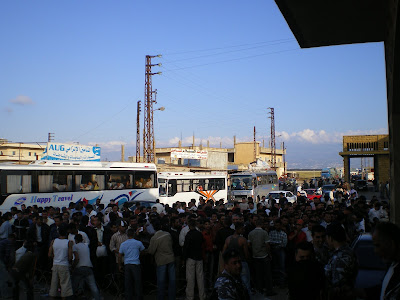 Most of them had no luggage, just a bin bag or burlap sack of stuff. One guy was carrying only a television. These, the driver explained, were Syrian workers who were leaving Lebanon until the trouble blew over. Our driver, who insisted on being called Mike even though his named was Mohammed, wore sunglasses that he never removed and drove a Buick Park Avenue. He had lived in Vancouver for eleven years and loved American cars. I asked Mike what he thought about the situation in Lebanon.
Most of them had no luggage, just a bin bag or burlap sack of stuff. One guy was carrying only a television. These, the driver explained, were Syrian workers who were leaving Lebanon until the trouble blew over. Our driver, who insisted on being called Mike even though his named was Mohammed, wore sunglasses that he never removed and drove a Buick Park Avenue. He had lived in Vancouver for eleven years and loved American cars. I asked Mike what he thought about the situation in Lebanon.
"I am for my family and my God. Fuck all," he answered.
What about America?
"Fucking Bush...Bush sharmuta," Mike spat. "But I love the cars."
After leaving Syria, we drove to the Lebanese border office. It was bedlam. There were hundreds of people clamouring to be let past the chain so that they could leave. The entry hall was completely deserted. I filled in the form and handed it to the border guard.
"Your job?" he asked.
"Technician," I said. It's the most innocuous definition of something I do for money that is still technically not lying.
The guard looked at my form, then at my passport, then at my face. He gestured to the baying mob outside and to the empty entry hall.
"You want to come in?!" he asked incredulously.
I nodded eagerly. He stared at me as if I had five noses for a moment and then gave me back my passport.
"Welcome to Lebanon," the guard said, waving me towards the exit. On my way out I could have sworn I heard him call me an idiot.
We piled back into Mike's Buick and entered Lebanon. The coastal road that winds from the border to the centre of Tripoli is beautiful, overlooking mountains to the left and the sparkling Mediterranean to the right. The sea view is broken occasionally by ingenious shacks made from all manner of material, built by the homeless. Cardboard boxes, sheet metal, jerry cans, plastic bags, everything that is tossed away is put to use to make their houses.
The road was littered with the remains of some burnt tires and piles of branches and grass, left there to block the road the previous evening and that morning. We passed through several checkpoints, all of which are routine for that area of Lebanon and not because of the current situation. Mike pointed to a skeletal array of broken and bombed-out buildings. They jutted out of the wasteland that separated the highway from the sea. Some buildings were reduced to dust, others had the odd finger of concrete stubbornly sticking out. Others remained as they were but with all the walls missing, looking like the blueprints of houses rather than houses themselves. The ruins were made even uglier by the beauty of the seascape behind them. These were the remains of the Nahr-el-Bared refugee camp. Two days later I would learn more about the fate of the camp and the people who lived there. Passing by in the car, Mike would only explain that the camp was bombed by Saad al-Hariri's troops last year because the Saudi-funded Fatah-al-Islam group had taken up residence there, hiding among the Palestinian refugees. It was one of the worst instances of military action against the Palestinians but had gone largely unreported in the international press. Now the only legacy of the camp is the plethora of checkpoints that separate it from Tripoli proper.
We arrived in the centre of Tripoli to see armoured cars and tanks everywhere. Troops were deployed on every corner for several blocks in each direction. Thirty minutes before we arrived, shots had been fired, allegedly at the police. The army had responded by deploying in the centre of the town. All the shops were closed. People stood on corners, on pavements, even in the road, watching the troop movements and occasionally talking into mobile phones. Bartek and I looked at each other. It had spread from Beirut pretty fast. There was a palpable tension in the air, a feeling not of threat but rather of uncertainty, as if violence could explode from nothing at any minute. Over the next few days that I spent in Tripoli, that feeling disappeared quite rapidly, although whether as a result of less tension or just of me getting used to the situation I can't say.
The Buick's alternator gave out just as we parked. Mike swore and kicked the car a few times and then took us to the main square. After asking around, one guy showed us where our hotel was. The Pension Haddad, run by the family Haddad, is a lovely apartment with several rooms with two or three beds in each. For $7 a night I had hot water, free chai and a very familial atmosphere. On their business card, it says "Miss your Grandma?". Grandma Haddad was an incredible old crone, bent double with a hunched back and a weary, wrinkled face. Her back was so torturously pretzeled that I once saw her scrubbing the floor without actually bending over. I'm not kidding.
The common room in the pension was populated by a British guy with a broken shoulder fearfully waiting out his last day and a Danish guy who worked for the Danish Foreign Office in Jerusalem. The Dane, Phil, told us about what Beirut was like before he got out. He had arrived in Tripoli from Beirut that day. He had been walking to a bus stop and fighting had erupted around him. From what he told me, and what seemed to be common to everyone's accounts, the Hez were not in any way threatening to foreigners or even aggressive. Whenever someone I spoke to had been in the wrong place, the Hez had courteously moved them on and warned them to avoid the area. One Hezbollah gunman had even walked a couple I met to their hotel just to make sure they got there safely. Another backpacker, an American Jew, had been hitching in Lebanon and been picked up by three Hezbollah fighters. As they talked and found out he was American and Jewish, they were at pains to explain that they had a problem with the American government, not the American people, and that their fight was with Israelis, not Jews. How representative of the actual Hezbollah party line that is I do not know, but it was a common theme that the Hez made a clear distinction between what they consider the Zionist enemy and other people who simply share the same religion. When I was to talk with some of them later, in Baalbek, I received the same impression.
Bartek and I went out in search of food. We saw a crowd gathered outside a bank. A large black Mercedes was parked there. Militiamen in olive green vests carrying M16s stood guard on both sides of the street. The crowd surged forward as someone got into the car and then, as the Mercedes left, the crowd dispersed. Ahmad, our host at the Pension Haddad, told us that the guy in the car was the leader of the local militia. Tripoli is predominantly a Sunni city. They are supporters of Hariri, not of the Hez.
After eating, Bartek and I went for a walk through the old town, the abandoned souk and around the river up to the Citadel, an old fortified castle that stands proudly looking out over the hillside neighbourhoods. Tripoli was quiet. The air was still. An occasional motorbike would whizz past and the rider would wave a muted hello. After soaking up the views and both agreeing on the feeling of walking on eggshells, Bartek and I returned to the pension and went to bed.
Subscribe to:
Posts (Atom)
